Not the End of the World
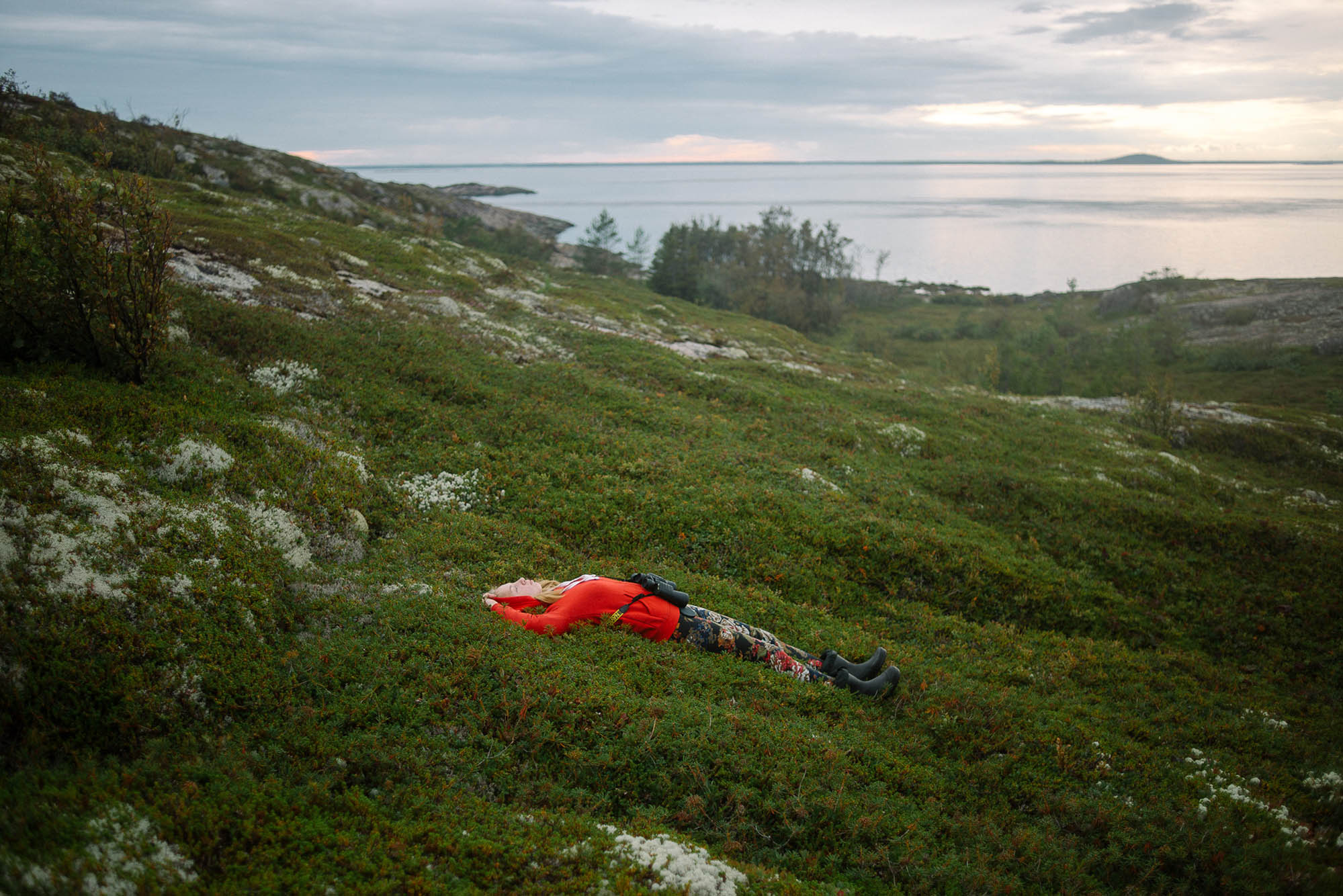
Lyudmila and her husband worked as lighthouse keepers. The lighthouse closed, husband gone, Lyudmila became a lonely caretaker on the edge of the earth
In the summer of 2010, on the island of Bolshoy Zhuzhmuy in the White Sea, the shortwave radio crackled. And then Nikolai Ageyev, the lighthouse keeper, heard this: “A decision has been made regarding reduction of the number of lighthouses, and your service is being terminated.” For Nikolai and his wife Lyudmila, who had been working as caretakers of Zhuzhmuy lighthouse for seven years, the news was devastating.
Prior to this cutback, there had been several dozen lighthouses on the White Sea under the navy’s purview. Zhuzhmuy – one of the oldest in Russia – had been lighting the way for ships since 1871. First it was a wooden structure, later it was rebuilt out of steel. Each lighthouse has its own unique call sign and flash frequency. Zhuzhmuy’s sign was “wineglass,” and it flashed a series of four blinks, each lasting four seconds. Its beacon was visible from 30 kilometers away.
Nikolai was the third generation of lighthouse keepers in his family, following in the footsteps of his grandfather and father. He was even born at the lighthouse. Since his parents could not immediately travel to the mainland to register their son’s birth, he is “officially” a month younger than his true age (his birth certificate gives January 13, 1958, as his birthday rather than the actual date: December 13, 1957).
Nikolai did all his schooling on Zhuzhmuy, and worked as a mechanic at the lighthouse. He then left for the mainland, returning to visit his parents and the cemetery – the entire dynasty of keepers is buried on the island, and it is the only lighthouse-keeper graveyard that has been preserved in Russia’s North.
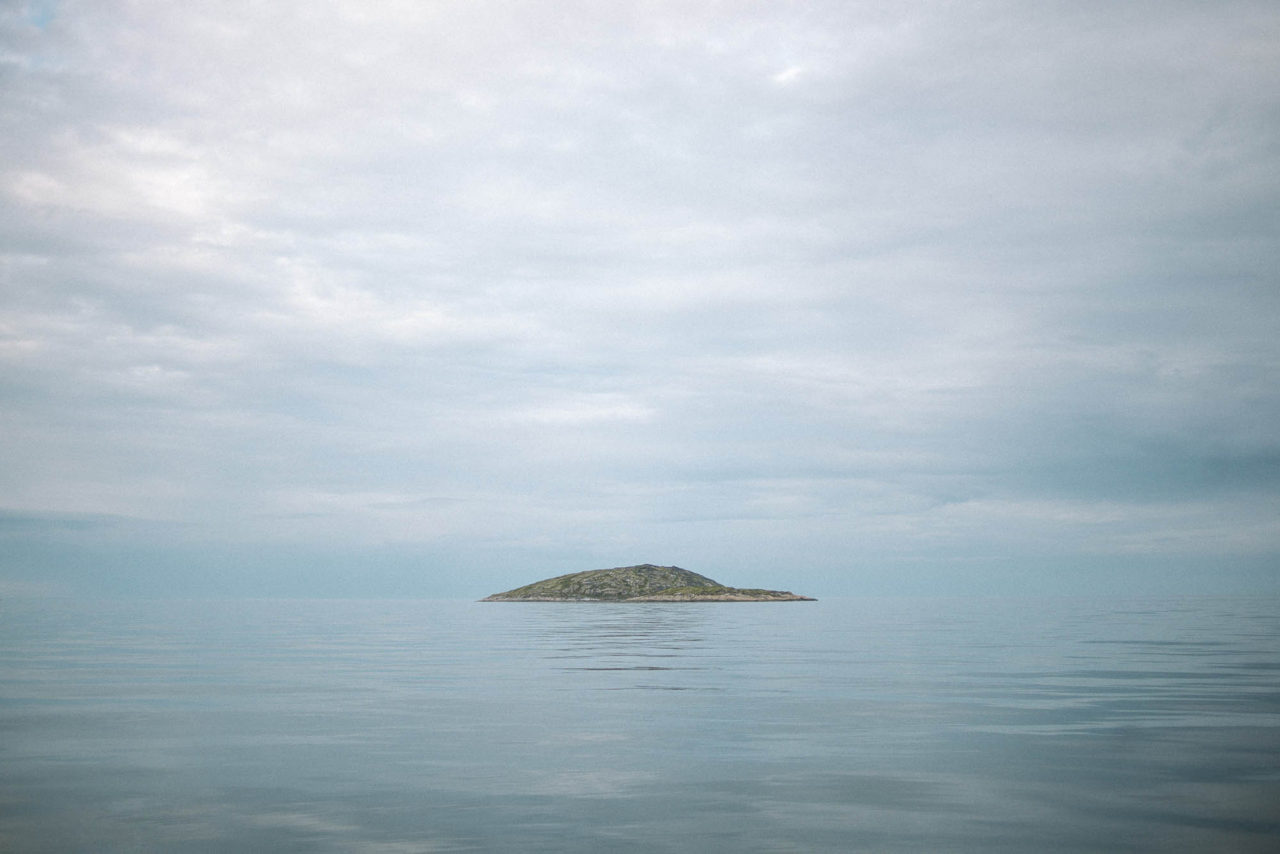
Lyudmila Ryntsina lived in the village of Shuyeretskoye, in Karelia’s Belomorsk District. As the head of the town’s electoral commission, she would fly to Zhuzhmuy. In the 1990s, lighthouse keepers and meteorologists were still living on the island and all needed to be guaranteed their right to vote. Lighthouse keepers only left the island in extreme situations, so Nikolai’s parents asked Lyudmila to collect their pension for them, and hand it off to their son, who lived in Belomorsk (a city not far from Shuyeretskoye).
And so, during that money handoff Lyudmila and Nikolai became acquainted. By that time, Ryntsina had split from her husband and was raising her six children (five girls and one boy) alone. Nikolai came to visit her and took a look around: a broken-down stove; laundry drying on lines… It was immediately apparent that she was having a hard time of it alone, so he declared, “I am going to live here.”
Lyudmila hastily replied, “Kolya, do you see what I’ve got here? Six!”
“What of it?” he answered.
And he stayed.
AN ISLAND OF TWO
When Nikolai’s parents died, someone not from his lighthouse-family was hired to take charge of Zhuzhmuy lighthouse. He drank and neglected the lighthouse and its upkeep. So he was fired and the job was offered to Nikolai. Given that there was basically no work in Shuyeretskoye, Lyudmila and Nikolai discussed the offer and agreed to resettle on the island.
You can only get to Bolshoy Zhuzhmuy by boat. It’s a 50-kilometer journey that takes five to ten hours, depending on the weather. The island itself is huge, with boulders, sand, and forest. In the winter it is covered with impassable snowdrifts and buffeted by icy winds. The lighthouse and the official keeper’s house, where Lyudmila and Nikolai were to live, sits on an elevated spot about a kilometer from the shoreline. The only means of communication with the mainland is shortwave radio. There is no doctor, and there are no stores – nothing but wilderness.
The couple brought their entire household to the island, including goats and chickens. They built a sauna, fixed up the home, and basically put everything in order. Their bosses praised their efforts.
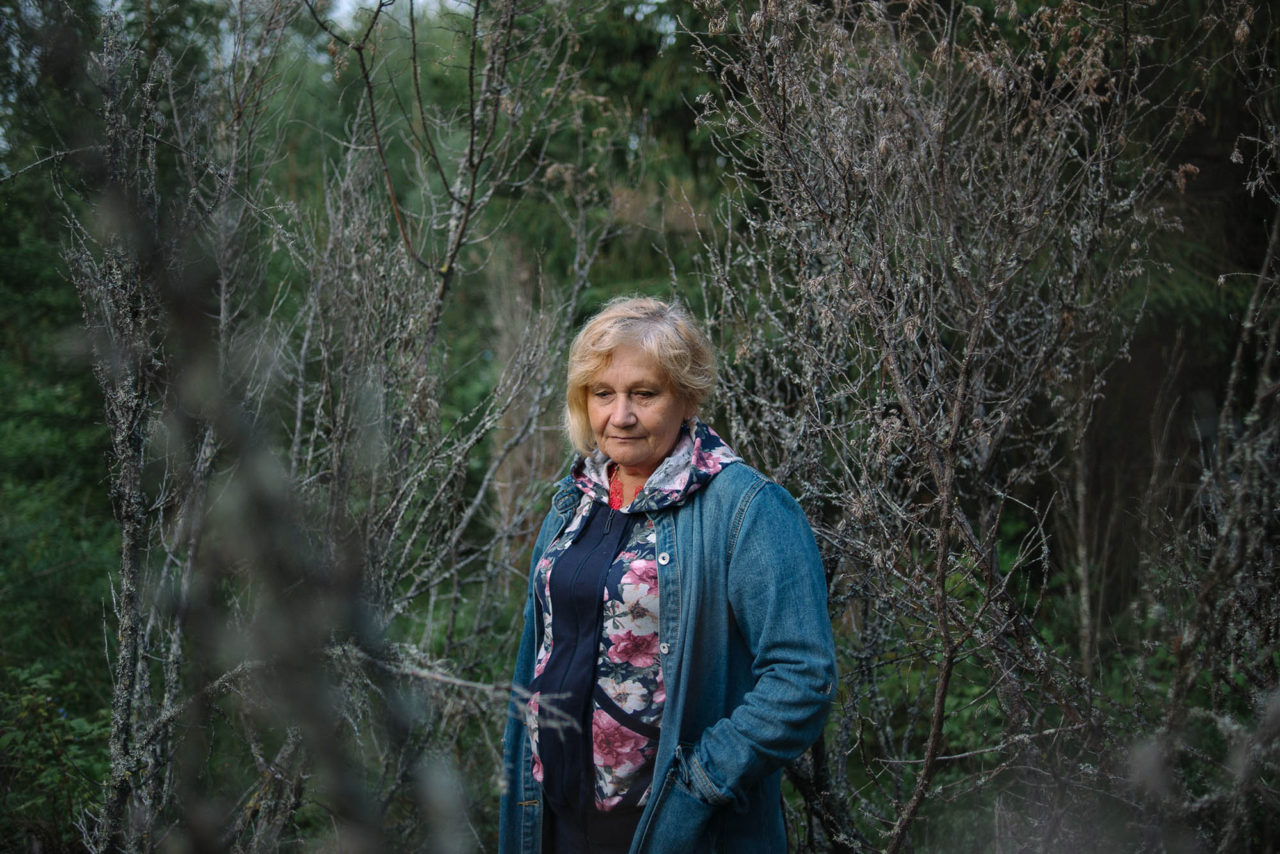
During the summer, there were seasonal workers on Zhuzhmuy, gathering seaweed. But in winter the island emptied out, and the caretakers were the only two left behind.
But they were not lonely, as the demands of their work filled their days. Morning and night, they were required to communicate via shortwave with neighboring lighthouses, to report that everything was as it should be. Then they had to charge up batteries, do repairs, and turn on the beacon according to the set schedule. And every day they had to make entries in the official journal.
During the day CB:2 battery was recharged (10 hours).
The day was taken up with hauling wood to the plant.
Communications at 9:00. Could not make contact with Zvezda.
The lighthouse lamp was turned on. It shone without issues.
“In the evenings, Kolya and I would stand at the top of the lighthouse and look out over the sea and up at the starry sky. It was beautiful,” Lyudmila recalls. “We would watch the ships come toward the lighthouse and sail along the waterway. We were not lonely or afraid. We were happy.”
In the winter, seals swam along the icy shores, and fox tails flickered in the forests. In the summer, the caretakers gathered berries, and endlessly cut the grass. Nikolai fished all year round. And they trod up and down, up and down the lighthouse. 110 steps. Up and down. Down and up. They survived the winters without difficulty. And in summer they occasionally took a boat to the mainland, to visit relatives and stock up on groceries. The rations delivered to the lighthouse annually (canned food, cereals, sugar, tea) were never enough.
Every outing on the sea was risky and, as Lyudmila put it, brought “grey hairs.”
“Storms on the sea are horrific and sudden,” she said. “You head out on quiet seas, and then a few hours later waves rise up taller than the boat. At such moments, it was always a joyful thing to see the beacon of the lighthouse in the darkness: there was a warm feeling of home, of life. The light is burning, calling us; dear one, soon we will be there.”
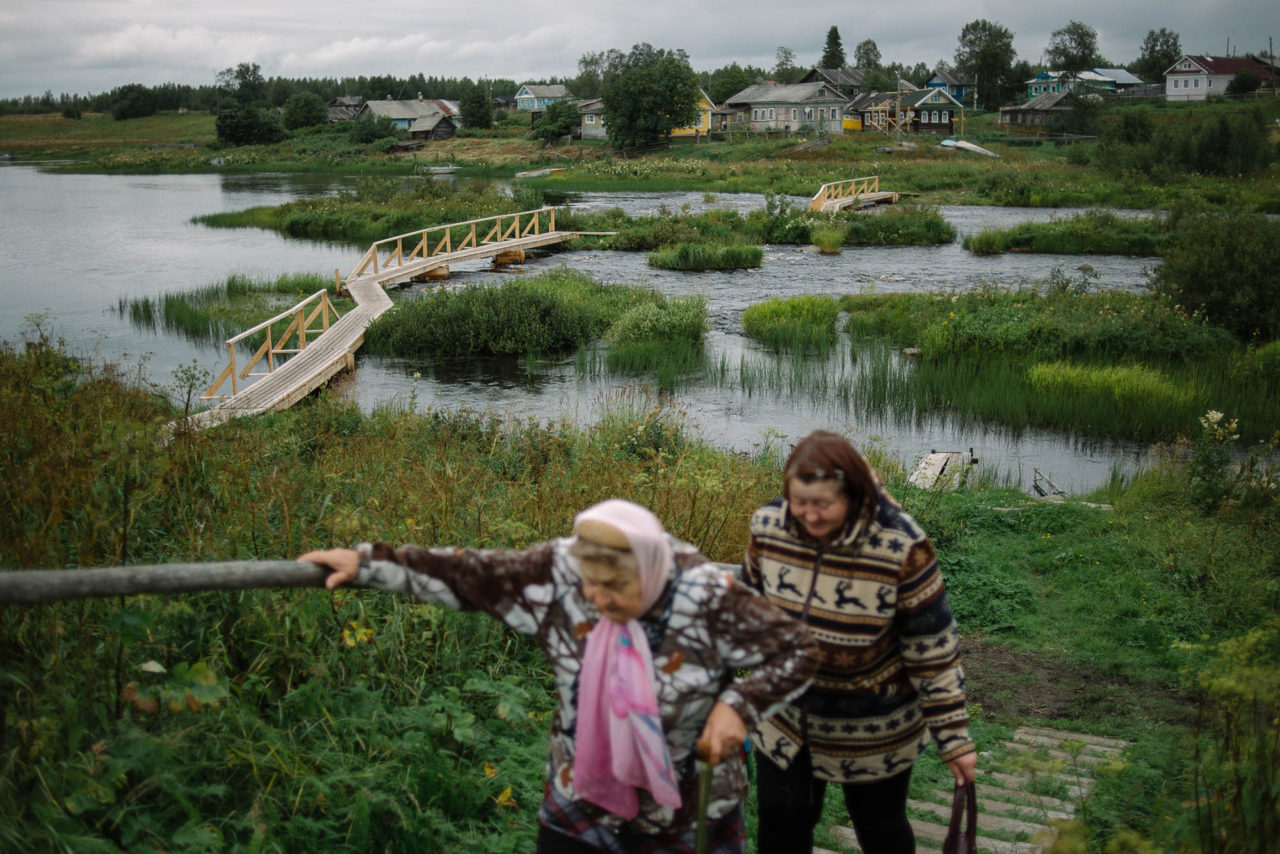
All sorts of things happened at sea. Once, Lyudmila was submerged up to her neck in the water during a storm, holding onto the boat while Nikolai tried to moor it. Or there was the time Nikolai and his young granddaughter fell into the icy water near the shoreline, and the child, freezing to death, cried out, “Babushka, I am dying!” Or the time that a wild seal chased after their grandchildren along the shore. (“We never thought they could run on their fins, but they can go at an inhuman speed.”) Or the time that the sea washed headless seals ashore – the gruesome result of a poachers’ raid.
Yet, on balance, when considering their quiet life on the beautiful island, all of this was trivial. Life was good on Zhuzhmuy.
Lyudmila and Nikolai worked on the island for seven years. Then came the message over the shortwave. The keepers were given a few months to gather up their belongings, and they gradually transferred all of their possessions, all of their livestock, to the mainland. They put the lighthouse and the residence in order. The final entry in the watch journal was made by Nikolai Ageyev on August 7, 2010.
The lighthouse beacon was turned off. We weighed anchor at 20:00 and set course for Belomorsk.
There is no description in the journal of how the caretakers made their way to the mainland. Yet Lyudmila remembers it well.
“When we were leaving Zhuzhmuy, we found ourselves in a storm unlike any we had ever seen. The waves towered over us, and it was impossible to leave. Over all the years we had worked there, we had never had to return to the island due to bad weather. But that time we returned, and then we waited it out on Zhuzhmuy for a few days, until the waters settled. The lighthouse did not want us to go.
NEVER ABANDON ONE’S OWN
Zhuzhmuy lighthouse was not demolished. The large beacon was turned off, but the back-up light was left on in automatic mode. This smaller light is far dimmer and not visible from so far away, yet it does offer a reference point. And the larger beacon is no longer necessary: lighthouses are being replaced by GPS navigation.
After being let go, Nikolai and Lyudmila spent the fall, winter, and spring in Shuyeretskoye. They thought about Zhuzhmuy often: there was not enough work in the village to keep them busy. And so, when the shipping season began, they started to worry. How are things at the lighthouse? Is it still standing? What if someone goes there and pillages it? The old lighthouse has many valuable parts: brass handles, the plate with its name and the date of its founding, the rock crystal lens.
“We watched on TV how they deal with old lighthouses abroad,” Lyudmila said. “They convert them into tourist destinations, even turn them into hotels. But for some reason in Russia no one needs them. It was terribly sad. And also, there was our home on the island, in which we had invested so much! And so, Kolya and I got in a boat and headed to Zhuzhmuy, to take a look. As we approached the island we saw the dim light burning, and it made us happy – it was alive! We beached the boat and started to put everything in order. Then we stood there, thought about it, and decided to return and take care of the lighthouse each summer. So we ended up going to Zhuzhmuy for another eight years. As soon as the shipping season began, we would get our things together and go. We would clean up everything, clean the lens. Whoever stopped there to turn on the [smaller] light would change the batteries, but leave the old, used-up ones there, on top of the tower. It was messy and awkward. So we hauled them down the stairs. A lighthouse should be tidy.”
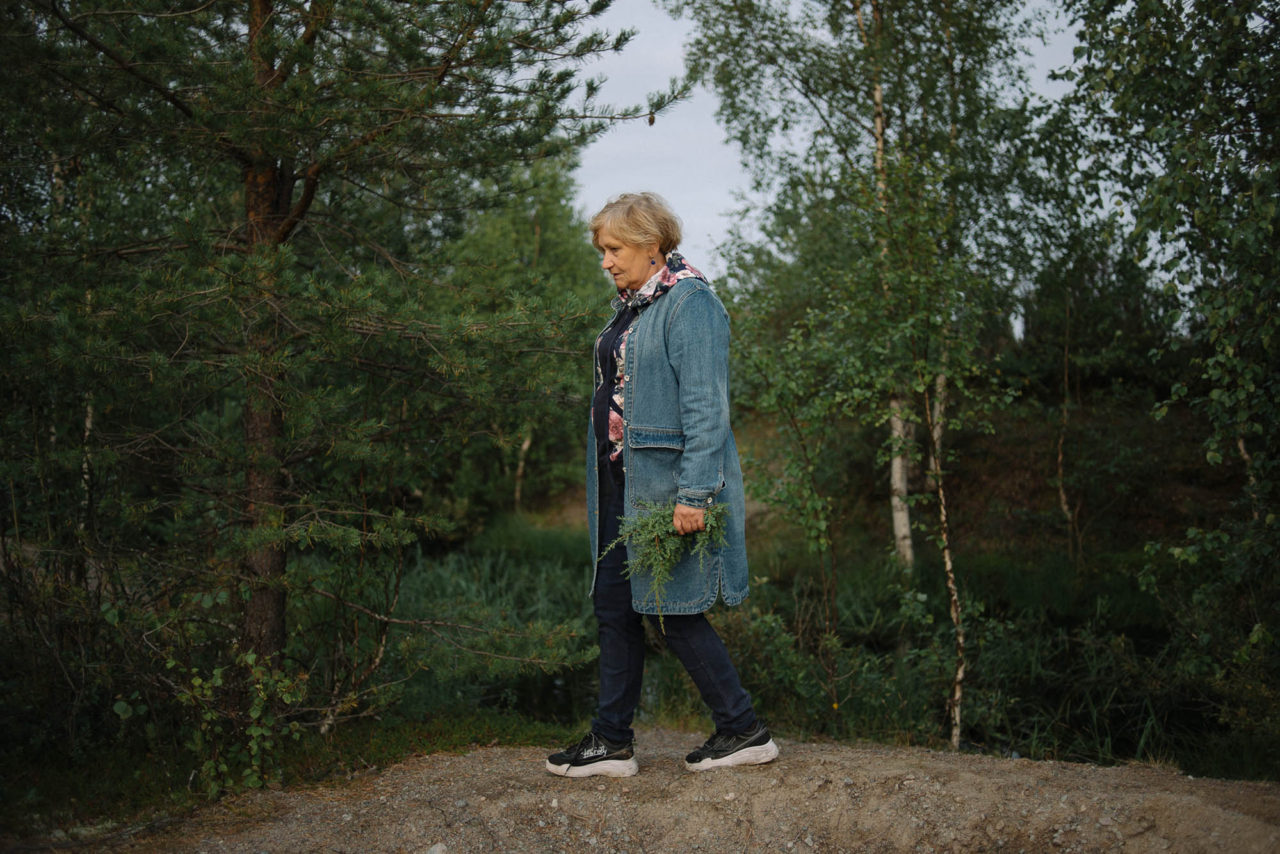
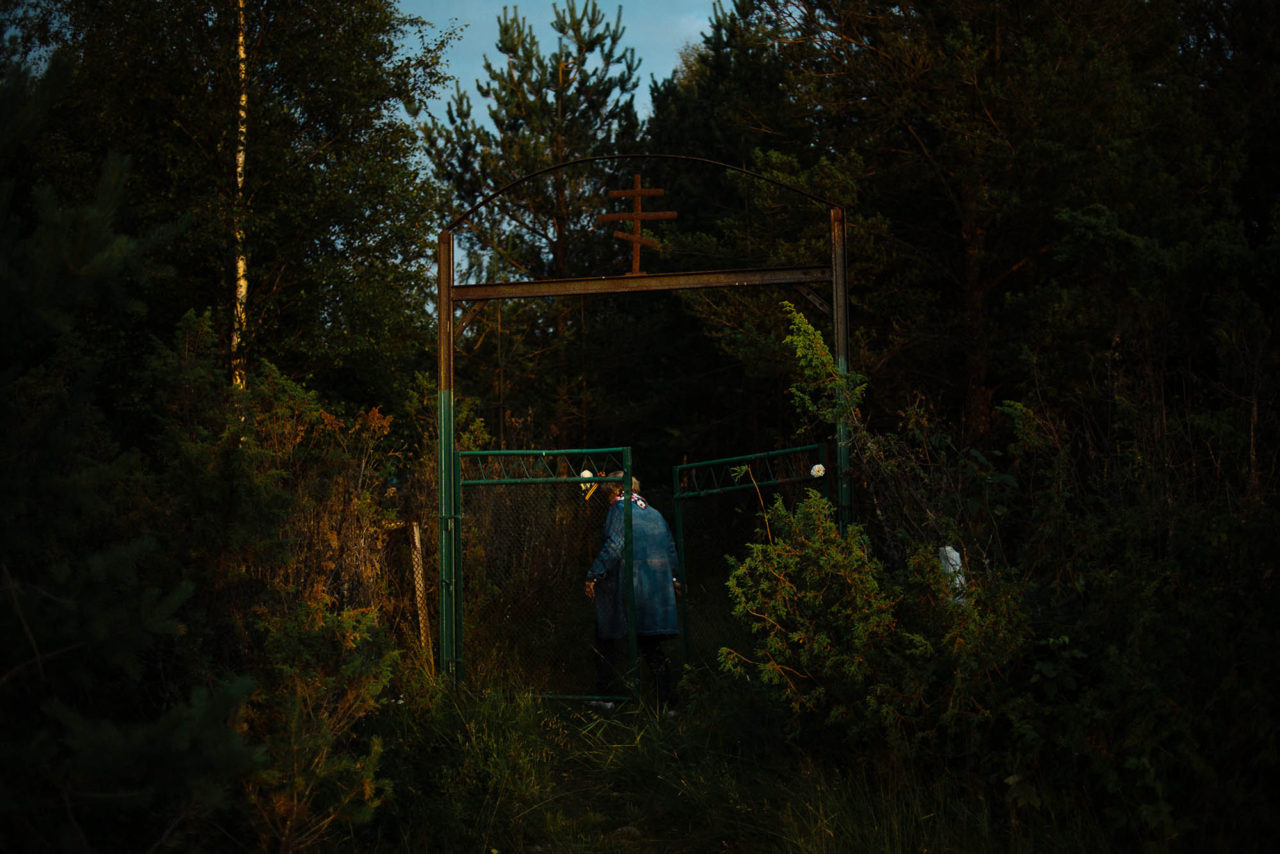
Despite their volunteer labors, they did not succeed in saving the lighthouse from theft. One year they arrived to find that someone had been in their home. The doors were open, the lighthouse’s brass handles and name plate were gone. Nikolai Ageyev’s heart ached: “If I had known, I would have removed them myself and kept them at home. Such barbarians!”
Another time someone stole an electrical line. And a third time they arrived to find dirt all over the place and the beds bloodied. “Some sort of stabbing took place there – we never found out what happened,” Lyudmila said.
The authorities knew that the former keepers were still looking after the lighthouse. They did not forbid them from doing this, but they didn’t encourage them either. The attitude was, “If you like, go ahead. If not, don’t.” They wanted to, and so they went, until, at the age of 60, Nikolai passed away.
WITHOUT KOLYA
Lyudmila lives alone in Shuyeretskoye, in the home where she was born. Next door is the empty house where her mother lived before she died, not long before Nikolai.
It has been almost two years since Nikolai passed away, but his photos are everywhere: on Lyudmila’s telephone, in the kitchen, on the shelf in the guest room. The home is cold and dark. Summer this year on the Shuya River felt like fall, but Lyudmila rarely stoked the stove or turned on the lights. She says she is saving wood, which is hard to come by here, and electricity, which is expensive. Yet it almost seems as if she simply does not notice either the chill or the darkness. Time has not yet healed her, and her life without her dear husband has yet to find its groove.
The first sign of Nikolai’s illness was when fish started making him nauseous. It had always been his favorite food, but now every time he ate it he would feel ill. Then his stomach hurt. They went to the city, to the hospital, and Nikolai was diagnosed with stage two esophageal cancer. There was chemotherapy, then an operation. They removed Nikolai’s esophagus and created a feeding port. Lyudmila fed him through a tube, pureeing his food. She herself hardly ate at all during this time: “How was I supposed to eat when Kolya was completely unable to?”
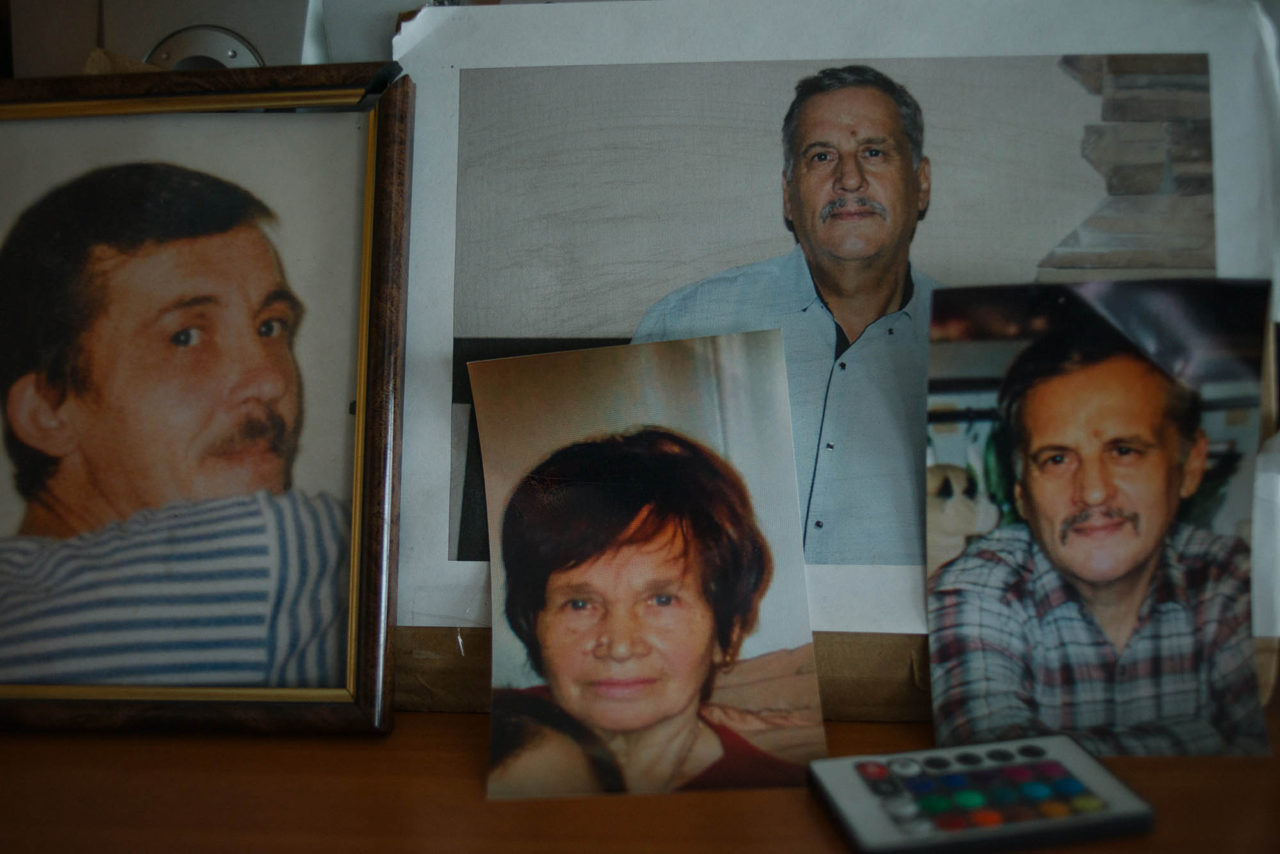
When Nikolai got a bit better, he wanted the doctors to restore his esophagus. A healthy man in his prime does not want to live his life attached to tubes. The operation came off fine, but an infection set in. Nikolai had to be readmitted. He spent four months in the hospital, and Lyudmila lived there in the ward with him, on a couch in the corner. She helped the nurses take care of her husband. Then Nikolai was discharged and sent home, despite not being any better.
One evening, Lyudmila bent over to kiss Nikolai and he kissed her back very lightly.
“Kolya, kiss a bit harder,” she said.
“I can’t Lyudochka,” he answered. “I don’t have the strength.”
Lyudmila called her daughter and told her she was uneasy that Kolya was feeling so poorly. Then she returned to her husband’s side and saw that he was not breathing. “I shook him so hard that his head almost fell off,” Lyudmila recalls. “I could not believe that he had died. I rushed to call one daughter, and then the other. It turns out I had called the same one three times. I was mad with grief.”
Lyudmila wailed for six months after Nikolai’s passing, leaving home only to visit the cemetery. He is buried in Shuyeretskoye alongside Lyudmila’s mother and father, despite the fact that his own family is all buried out on Zhuzhmuy. Among the many Pomor graveyard crosses in the cemetery, those of Lyudmila’s family stand out for their excess of flowers.
“Let them all be there,” she says of the island cemetery, “Kolya, he is mine. I sense that he is nearby. My beautiful, kind man. I can’t function without him. You know, recently I went into the cellar (where the potatoes are stored). It is so deep and dark there. I had never gone in there alone, without Kolya. I put my foot on the ladder and said, ‘Kolyenka, help me.’ And I climbed down it just fine, and the ladder did not shake, as if he were holding it.”
At that exact moment in Lyudmila’s retelling, a photograph of Nikolai fell from the shelf.
“What are you worried about, my dear man?” Lyudmila says as she picks up the photo, brushing her fingers across Nikolai’s face and putting the picture back in its place.
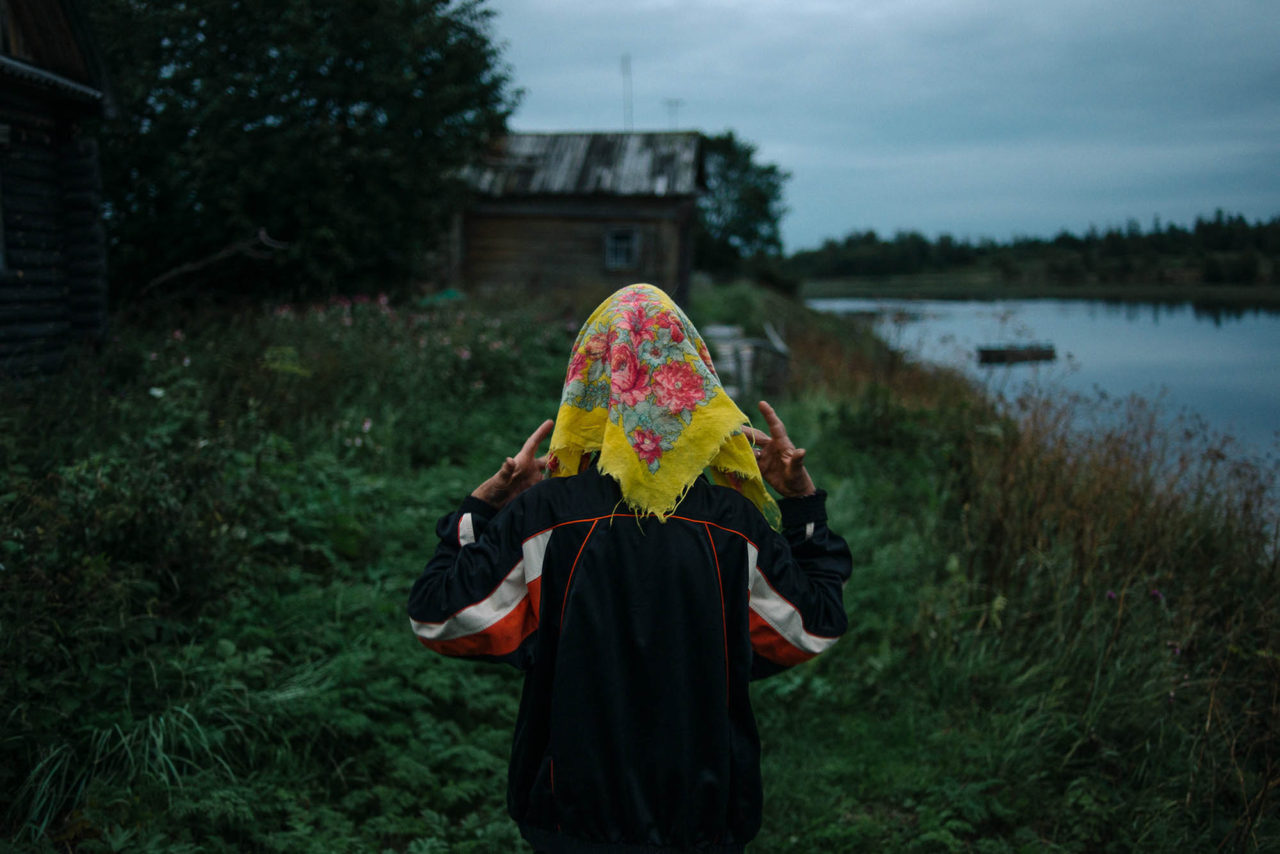
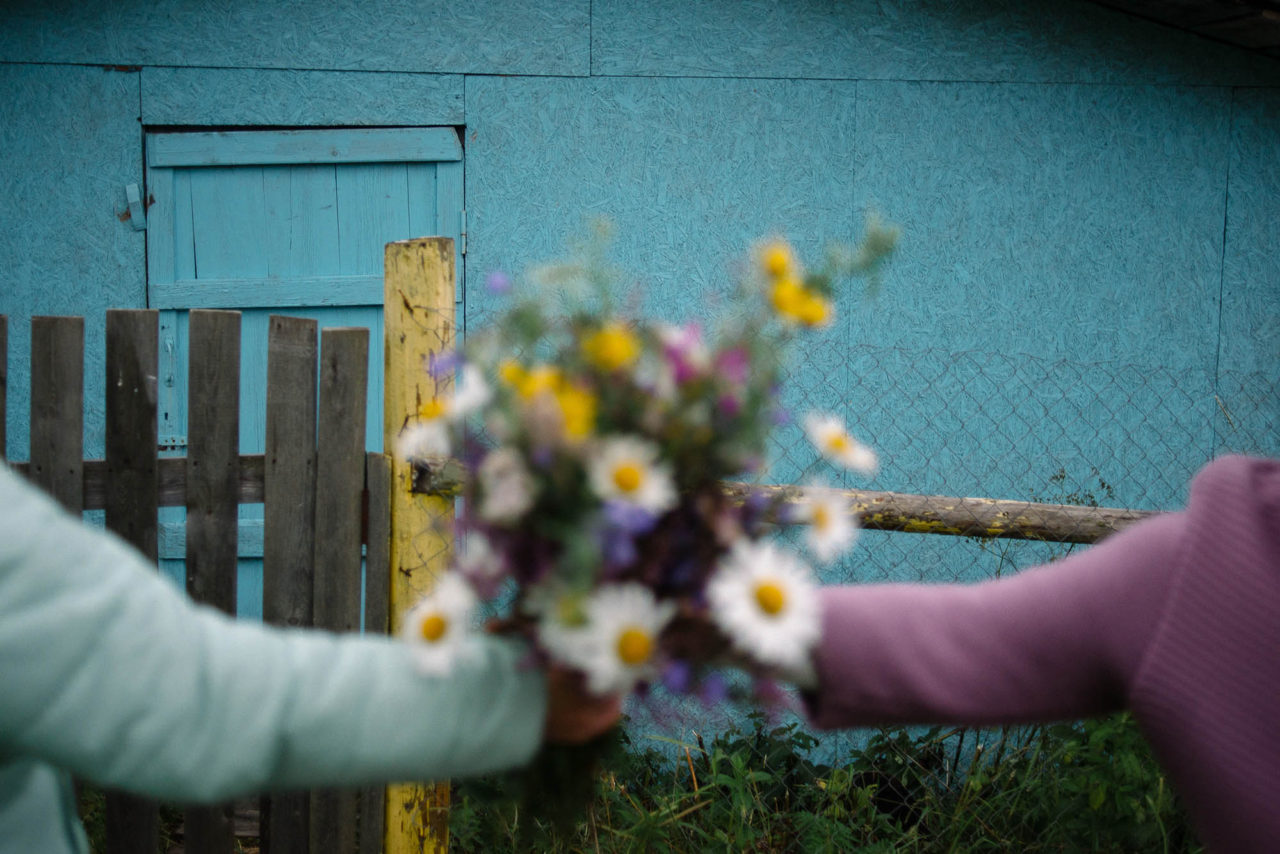
Since her husband’s death, Lyudmila has not returned to Zhuzhmuy. Last summer she was lost in grief, and this summer the weather was too stormy to cross the sea. Of course, to make the crossing herself would be suicide. “At first I cried whenever I thought about the lighthouse,” she says. “And now I worry, is it still alive? Sometimes friends arrive from the sea and say, ‘Lyud, your little flame is burning.’ But this year no one said anything. Maybe it has burned out for good.”
ISOLATION
Shuyeretskoye village is 520 years old. At the end of the nineteenth century, 1,500 people lived here. Houses stand on both sides of the Shuya River, which empties into the White Sea. The locals are Pomors, whose lives were always closely tied to the sea. For many years, the heart of the village was the fishing kolkhoz called Lenin’s Path, founded in 1929. In the local museum’s archives, the photographs show only women, because all the men were always out at sea.
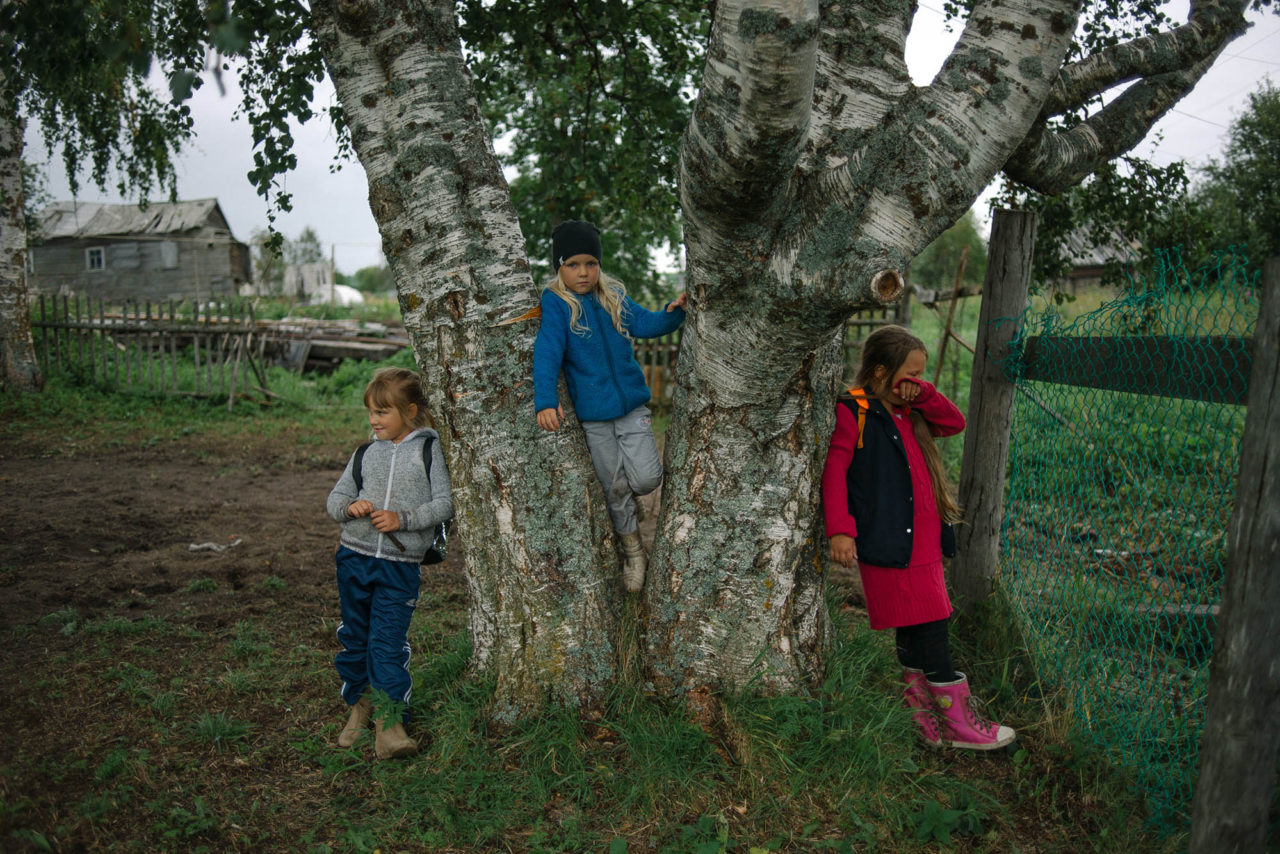
Like nearly all Russian villages that were once inhabited and densely populated, Shuyeretskoye is quietly dying. Many homes are empty, there is no local medical clinic, no sovkhoz or kolkhoz, no local government (they are governed from the village of Sosnovets, 60 kilometers away). Two years ago they shuttered the school, and the post office is only open twice a week for a few hours at a time. There is just a single store selling essential groceries for the entire village, and their prices are outrageous. There is not even a church. According to locals, it burned down in the 1940s, catching fire after a lightning strike. One resident happened to be looking out the window at the moment and remembers it vividly: “A glowing ball struck, the church was lit up with a pink light, and it burned to the ground.” They built a club on the site of the church, but it has not survived. The building is partially destroyed and boarded up. You have to climb through a window to get inside.
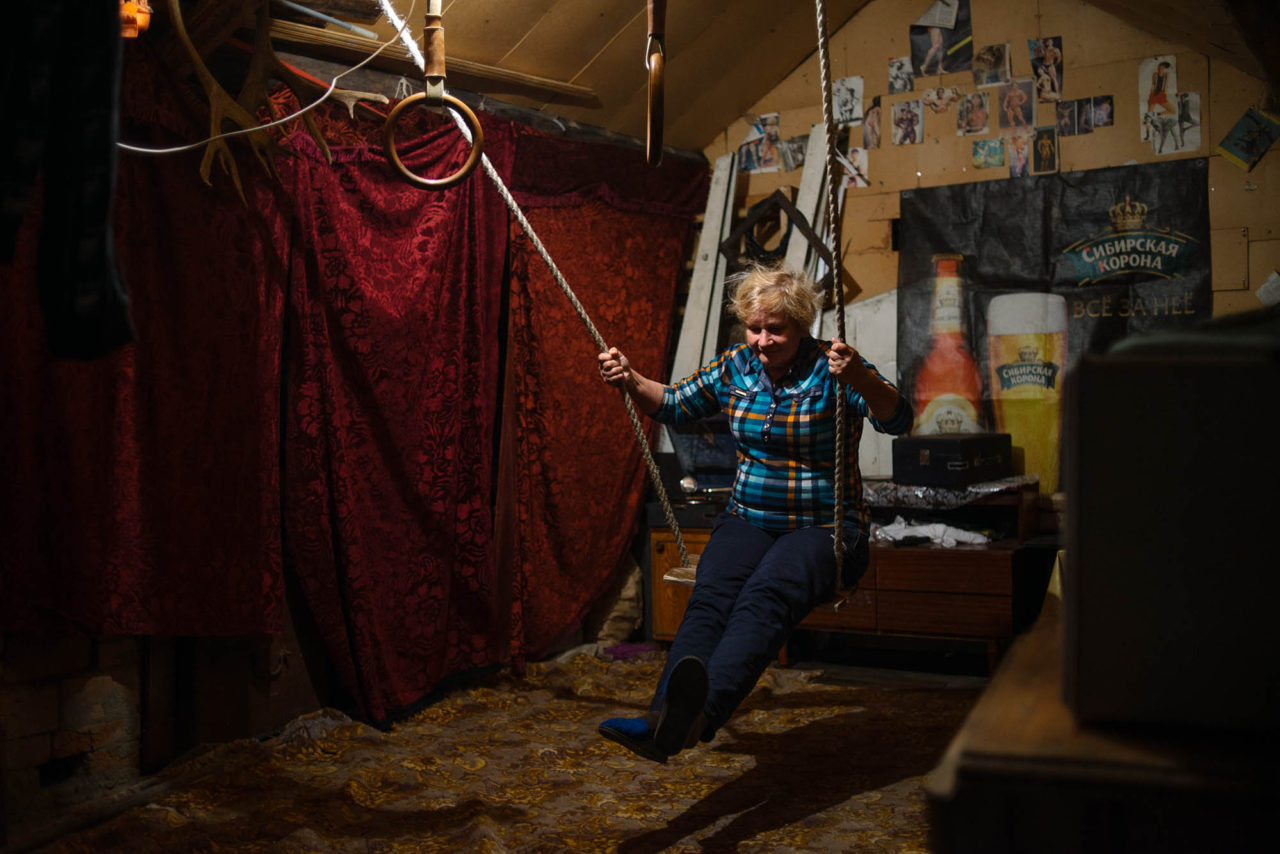
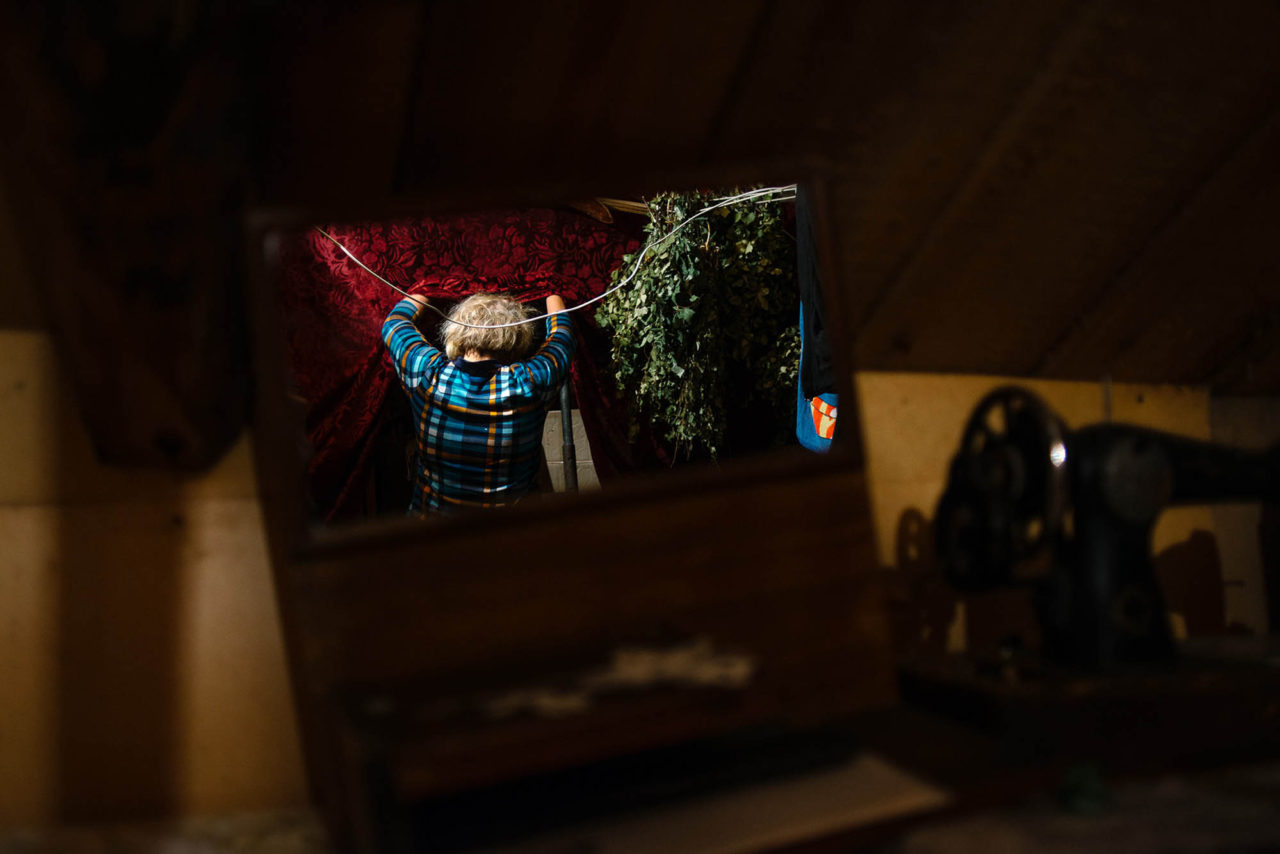
Today, there are just 100 permanent residents in Shuyeretskoye. And no more than 50 stay for the winter. There is no paved road to the village, you can only get to or from here by elektrichka – the suburban train. Before, the train stopped here daily, so residents could easily travel to the neighboring cities of Belomorsk or Kem for groceries or healthcare. Today, the elektrichka stops in the village just three times per week. If you don’t plan your trip to the city in advance, you don’t go. If you suddenly get sick, you can die. Anyone able to leave has left. There is no cell service, new homes are not being built, since there is not even any firewood – to say nothing of lumber for building or repairs. Lyudmila Ryntsyna, for example, heats her home with another home, slowly dismantling her old family izba, which stands next door.
The isolation forces those who remain to be entirely self-reliant. People expect nothing, and want only a peaceful old age and a pain-free death. And while the former is attained with few difficulties, the latter can be a bit trickier.
BAD LEG
Practically all the residents of Shuyeretskoye are retirees. You only see children here in the summer; they come to visit their babushkas. Near the shuttered library, five young fellows are diligently turning over the earth. “We are making a football field,” the oldest one says, leaning on his shovel handle. “We’ll dig it up, stomp it down with our boots, and then we’ll play. We have to amuse ourselves somehow, there’s no internet.”
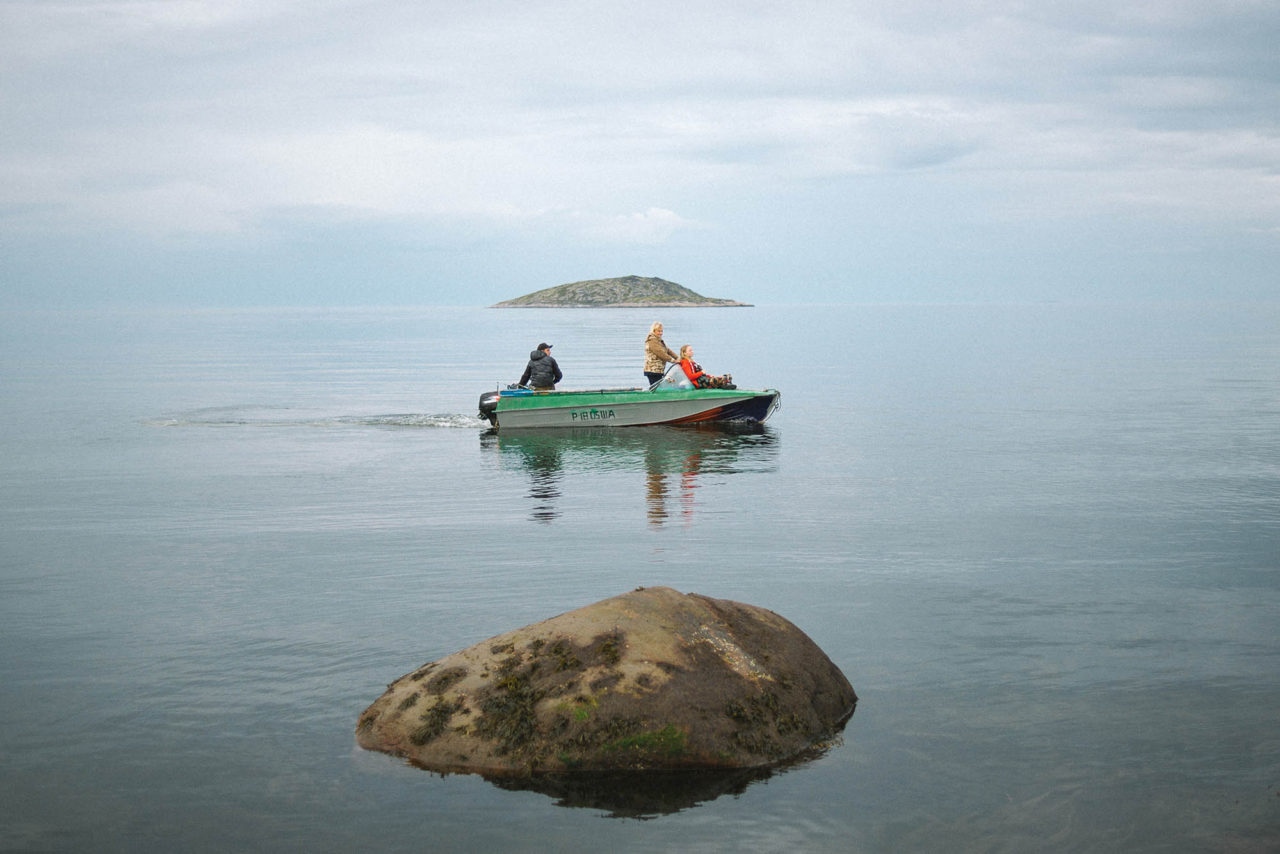
Near the bridge over the Shuya River a babushka grabs me by the elbow. “Dearie, help a babka cross. My head starts spinning on the bridge. It’s scary.” I take her by the arm and we cross together. The woman thanks me and gets out her wallet.
“Take it, my dear, for your labors.”
“For what?” I say, “What sort of labor?”
She insists and so I have to quickly walk away. Later, I learn from locals that this is what mutual aid has looked like for quite some time: people rarely help one another for free.
“The poor pensioners!” says a disgusted 80-year-old Taisia Gavrilovna. “These days, if you have to chop wood, you need to pay an alcoholic. You need water? The river is right there, but your legs can’t make it there and back. So you also pay for that. Before, a bucket cost 10 rubles, but now some are taking 100. There is a young couple here, and they pump water for us, simply out of friendship. And I can get them a plot in the greenhouse, if they ask. But such mutual assistance is rare.”
Taisia Gavrilovna’s floors are so clean you can see your reflection. The couch and bed are covered with beautiful blankets, the firewood is stacked in a neat pile next to the stove. Cleanliness and preservation of ancient customs is a distinctive feature of life in a Pomor village. Almost everyone has a Russian stove with built-in benches for keeping warm and open shelves instead of cabinets. Ancient icons can be found hanging in some homes – traditionally, if the home changes hands, they are passed on from owner to owner.
Taisia lived in Murmansk until she was 52. Then she retired and quickly became bored. She was not married and it was boring to live alone in a three-bedroom apartment. She traveled to Shuyeretskoye to visit a friend. Arriving by train early in the morning, she knocked on her friend’s door, but got no answer – she was still asleep. So, since she had nothing else to do, Taisia dug up potatoes from the garden and put them in a bag by the door.
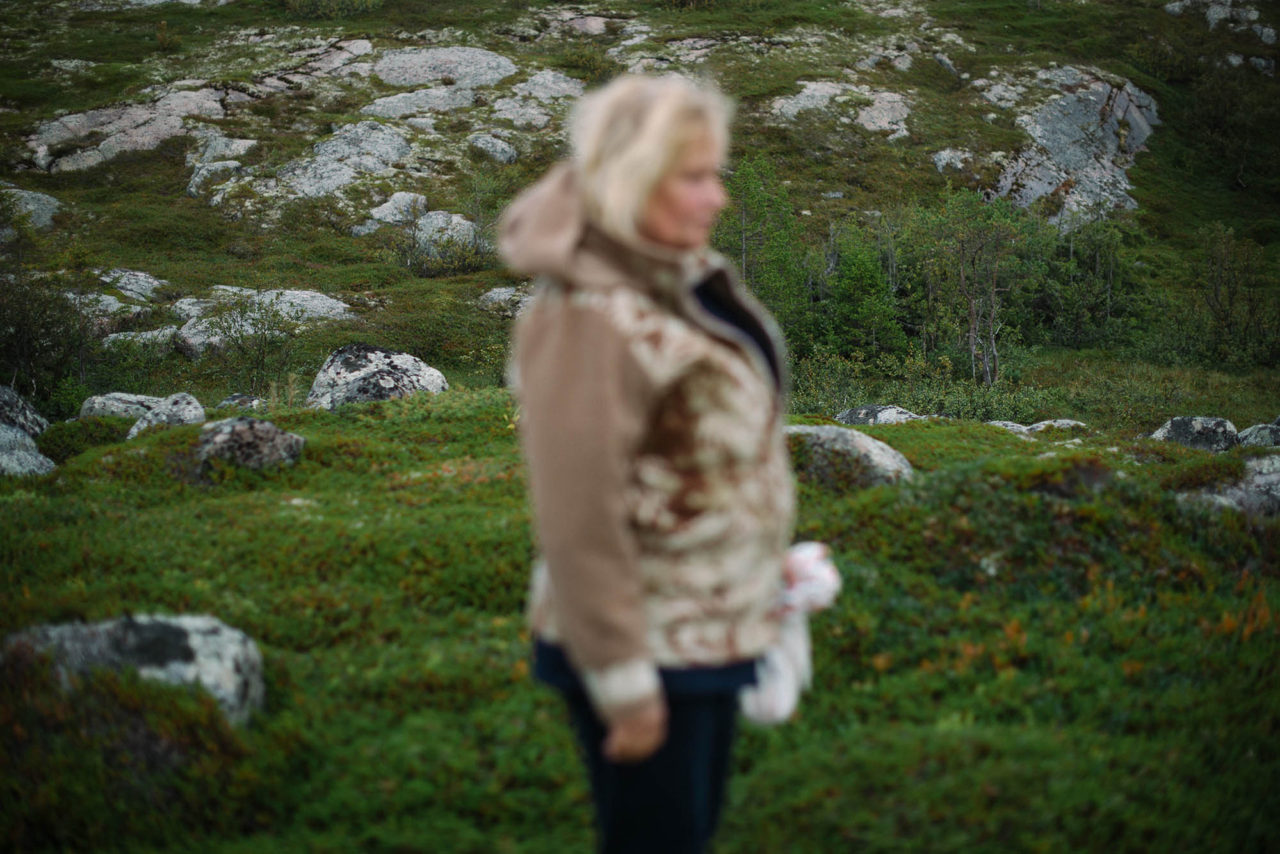
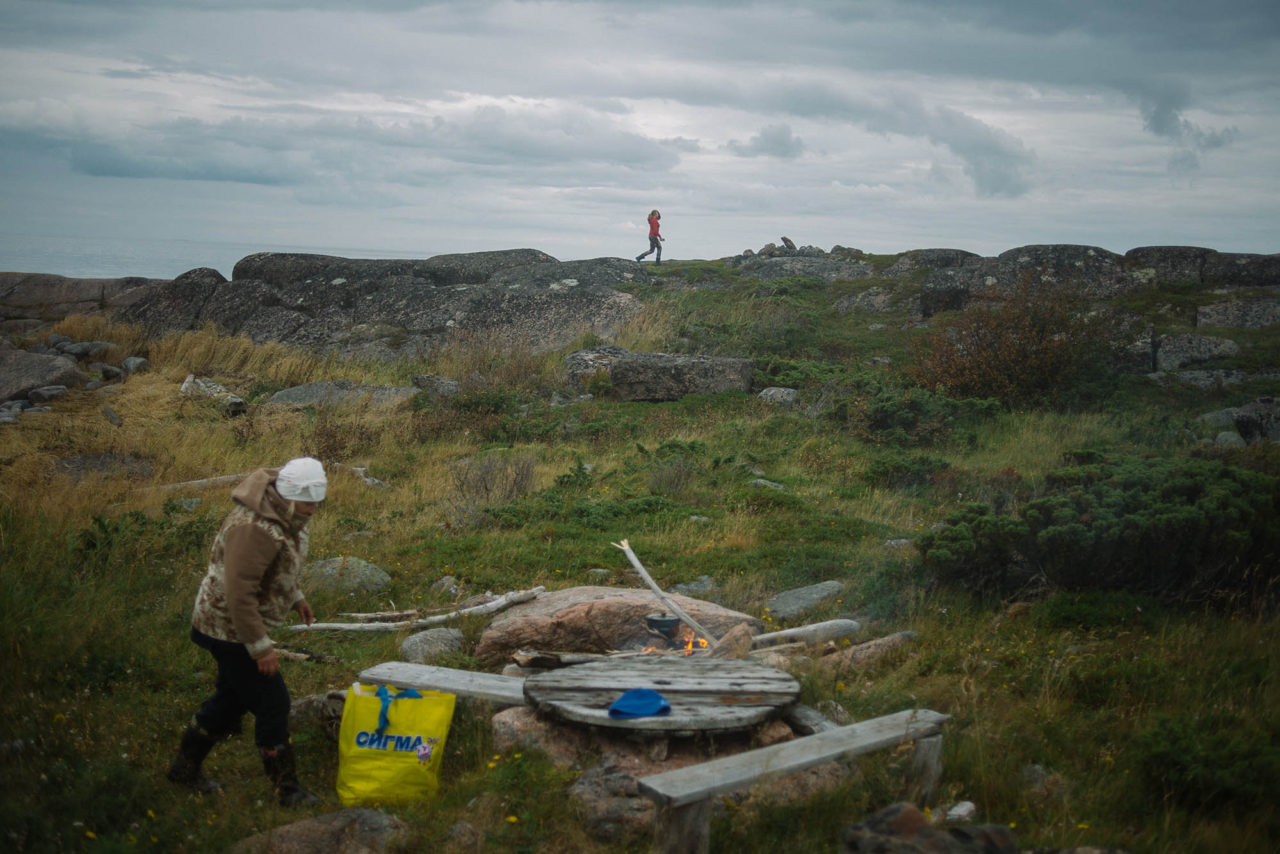
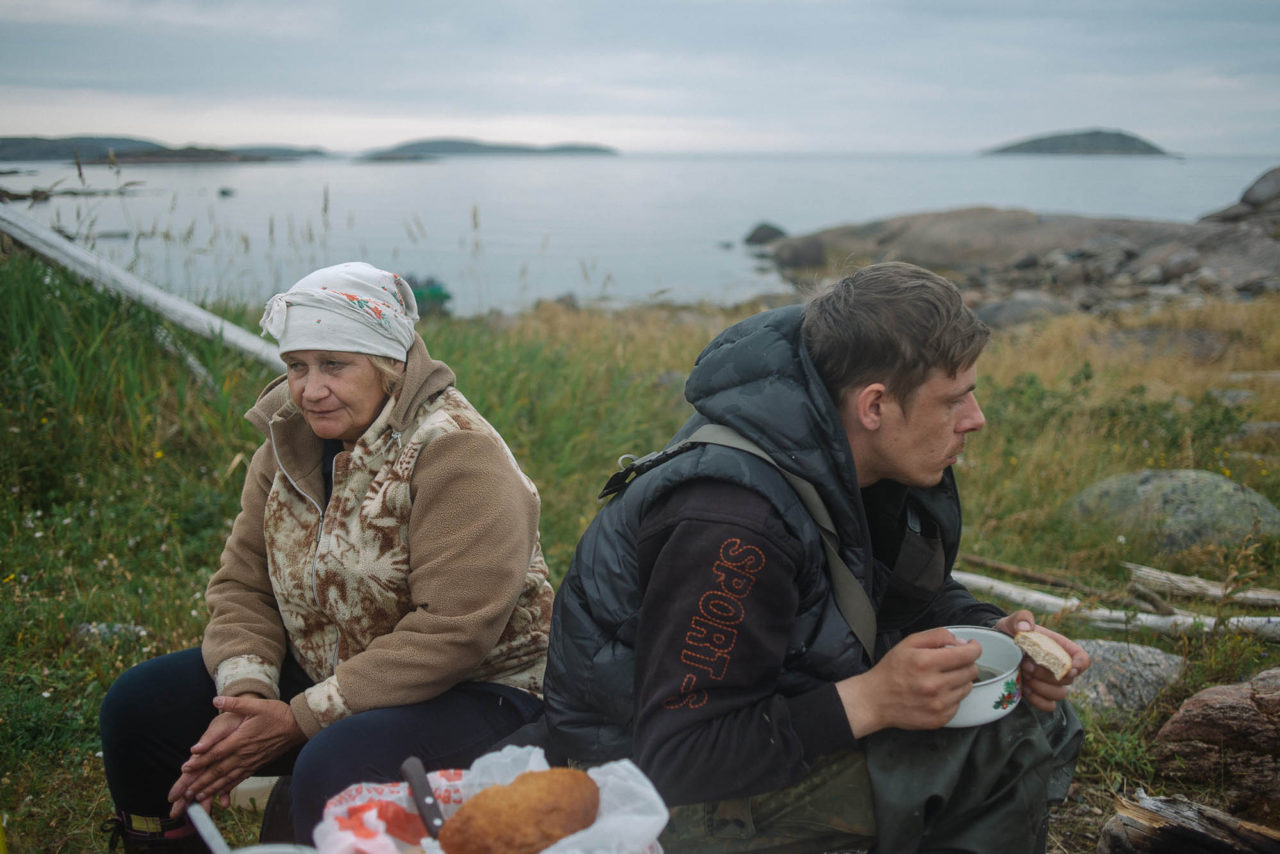
Once Taisia’s friends woke up, they were inspired to properly mark their guest’s arrival. Taisia’s friend sent her husband to The Toot to get some vodka (previously, liquor was sold by railroad workers on passing trains, and The Toot was what they called the “store on board the train”). Her husband returned with the vodka and his bachelor friend Ivan Chobotarev, who Taisia soon married. She then moved to Shuyeretskoye. “He was not then the way he is now,” the babushka sighs.
Ivan Maximovich Chobotarev is missing a leg, and he gets about in a wheelchair. A spacious room and some plank pathways in the yard are the entirety of his current habitat. “They cut it off because it was superfluous,” Chobotarev jokes. But Taisia Gavrilovna is not amused.
“The feldsher [a village health care worker] comes by once a month,” she says. “We sign up for an appointment with the salesgirl at the store. Those who can’t get out get a home visit. And if something happens on days when the doctor is not in the village, well God help you.”
Six years ago, Ivan’s leg began to hurt. At first, they waited to see what would happen. When the pain did not go away, they went to the clinic in Belomorsk. There they said it was nothing serious and sent them home. But the leg still hurt. Taisia requested a referral to Petrozavodsk, the capital of the Karelian Republic. They traveled nine hours by train and then sat for half a day at the clinic, waiting to see a doctor. “After they finally saw us, the doctor said, ‘There’s nothing for you here.’ And so I said, ‘What do you mean nothing? I shook and jounced for ten hours by train with him just so you could refuse to see us?’ Well, the doctor looked at his leg and said, ‘It’s not our department.’ And he sent us home. ‘Apply some ointments,’ they said. ‘It will pass.’”
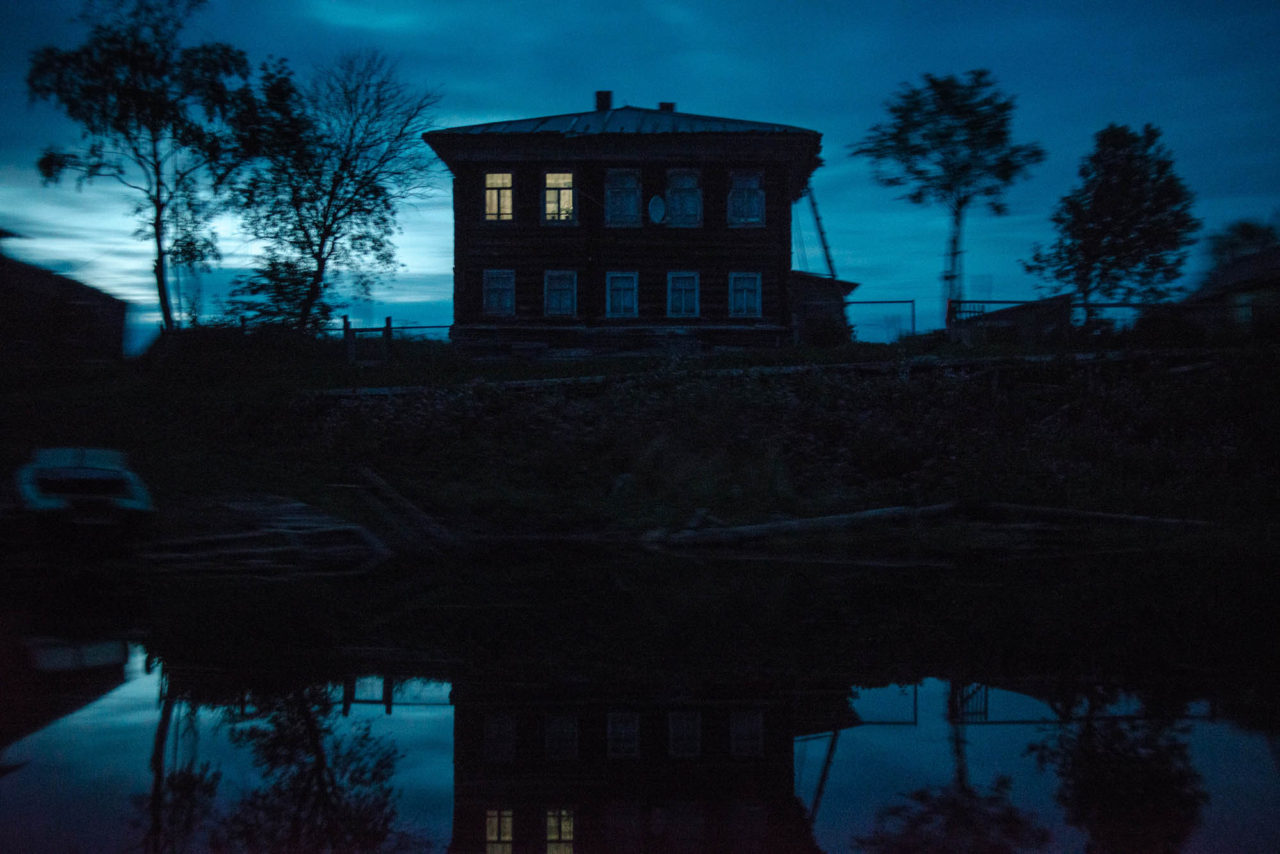
Taisia decided to purchase ointments in Murmansk – there is a better selection there. She hopped on a train and rode 900 kilometers, then went from pharmacy to pharmacy. Two days later she returned and applied everything she had acquired to her husband’s leg. But it still hurt and had begun to swell up. Nikolai cried out at night from the pain.
“At one point, a woman came here from Olenegorsk,” Taisia recalls. “She had worked here once as a nurse. I asked her to look at his leg and she said, ‘Tasya, he doesn’t have gangrene yet. But if black spots appear on his leg, it will have begun. Immediately sound the alarm and demand that they take him to the hospital.’ In the morning, I looked at his leg and saw spots. I snatched up all his paperwork, boarded the train and headed for the hospital. There, they say to me, ‘Bring him in.’ But this was Friday, and the next train from the village was only on Monday. So I said, ‘How am I to bring him to you?’ So, for two days, until Monday, he screamed in pain – it was an inhuman sound. I took him in on Monday and everyone there was shocked. They tried to calm me down, saying they would think of something. And that they did. The doctor comes out, ‘We must amputate his leg. Your husband agrees.’ And I say, ‘He’d agree to have his head chopped off if only the pain would stop!’ For as long as I have lived here [in Shuyeretskoye], they have never sent emergency services to evacuate a single person – they all are lying in the cemetery.”
After his leg was amputated, Taisia’s husband had a heart attack. Then they decided to move to the city, so that they could be closer to emergency services. But the Chobotarevs return to Shuyeretskoye each summer. “Here, he can go out into the yard, but there we have an entrance with steps – he just sits and stares out the window all winter.”
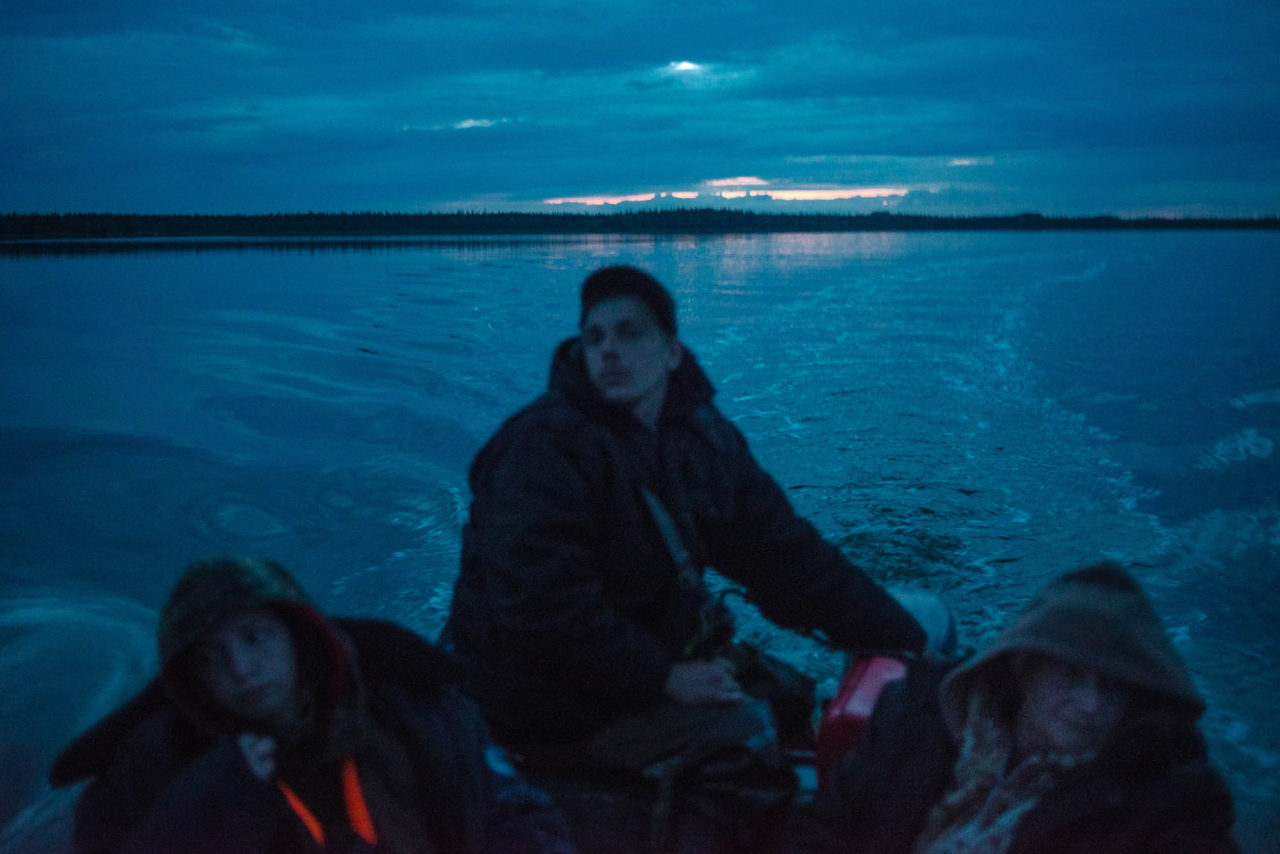
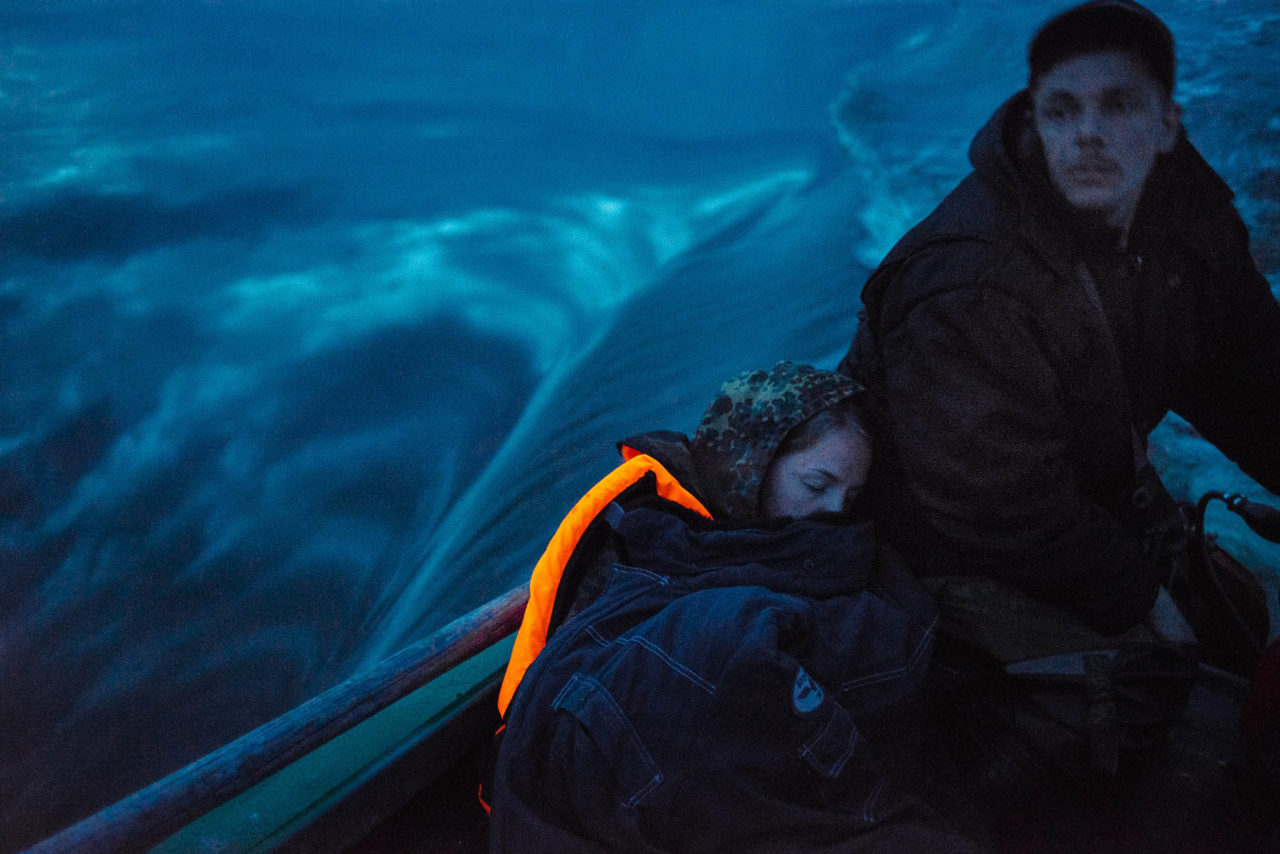
Nearly every home in the village could share a horrific story about health care. Once, a local resident suffered a heart attack. “The emergency services called,” Lyudmila Ryntsina recalls. “They said, ‘You have someone there urgently in need of hospitalization. Organize an evacuation.’ So what do we do? We got everyone together, got a stretcher, loaded her up and carried her to the station. We asked the watchman to get a freight train to stop. It stopped, we loaded her in, and ferried her off to the city. They saved her, and the entire village celebrated. But later she drowned while rinsing out her laundry from the dock.”
Then there was the time that her neighbors “lost” an old man. Someone noticed that he was nowhere to be seen. “They went to check on him, opened the door, and he was lying on the floor, stricken by a heart attack,” Lyudmila says. “I called emergency services, but no one came. I was actually in Petrozavodsk at the time and said that, if they don’t send someone, I would go to the ministry. Twenty-four hours later a young feldsher arrived. He looked the old man over and hauled him to the train on his motorcycle. But he died in the hospital, never regaining consciousness. Of course he died, when you consider the amount of time that passed between his attack and when help arrived!”
THE POMYORS
Every year someone moves from Shuyeretskoye to the city because of the inaccessibility of health care. Tamara Gridina, 83, got stuck in a snowdrift last winter and became ill. Tamara’s sister Galina lives in Severomorsk. This summer she came to Shuyeretskoye to move Tamara to the city. “How she was living here, alone,” Galina said, “it was horrible! She wasn’t strong enough to make a hole in the ice, so she was melting snow to make tea, can you imagine? Sometimes so much snow falls that you can’t open the door, and she hasn’t the strength to remove it. The point is, I am taking her away. I’ll bring her back next summer.”
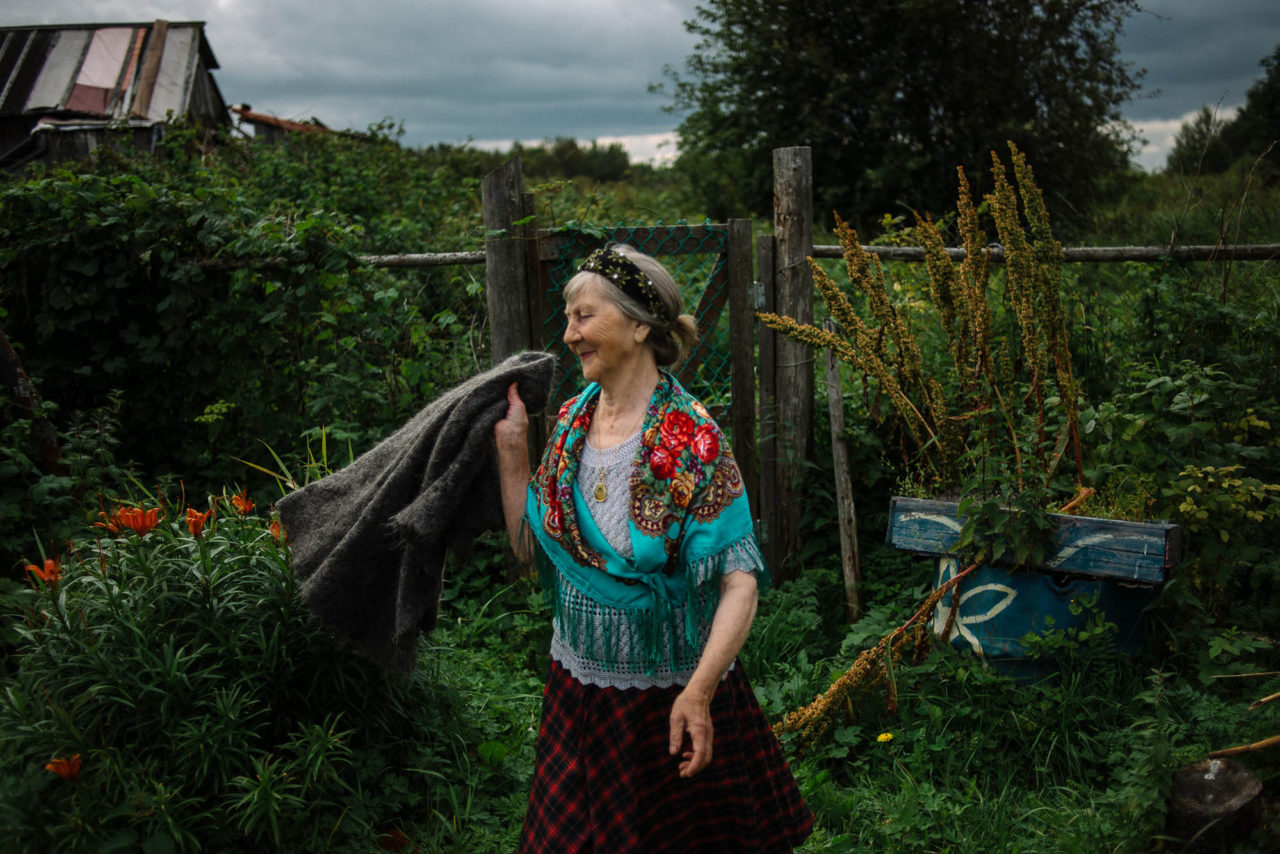
Tamara listens to Galina and anxiously clasps her hands together. “I can’t live in the city. How can I? In a stone building? I won’t survive the winter… And my cat will be left behind; he will die without me. Even so, staying here is scary. You die and there is no one to close your eyes.”
Despite the scary stories and obvious hopelessness, the overwhelming majority of the village’s residents are entirely satisfied with their lives.
Nadezhda Galanina, kissing the faces of her young goats, who live in her home with her and her cat, finds positive things in the village’s isolation and is not so sure that the village needs a paved road. “We don’t even have any way to lock up our houses. But if tourists start coming, we’d have to install locks. Some strangers already stole the icons from the oldest crosses in the cemetery. God only knows what else they might get up to.”
In another extremely well-kept home decorated with flowers and bright floormats, Tamara Matsko explains what she loves about living in Shuyeretskoye, why she has never lived anywhere else, and why she has all that she needs. “I have a pension. I have things to do. After you clean everything up, you heat up the stove, you cook dinner, you watch TV, and then it’s time to sleep. All I want is to die simply, right here, so that they don’t drag me to the train on a stretcher. We Pomors can get used to anything.”
Tamara purposefully pronounces it “pomyory” and not “pomory.” And then chuckles. “We had here an auntie Tanya, and if anyone asked her who was her husband, she would say ‘well, he died’ (Так помёр). [“He died” – pomyor, and “Pomor” are close homophones.]
“‘Well he died, so he died, but who was he?’ they would ask.
“‘Так помёр!’
“So that’s what we call ourselves.”
THE BRIDGE
Against the backdrop of “pomyors” who accept life as it is, Lyudmila Ryntsina seems quite strange. She tries to get her native village a better shake, although following the death of her husband she nearly gave up.
During their years on the island, Lyudmila was elected in absentia as head of the Shuyeretskoye Women’s Council (Zhensoviet). According to locals, back then several energetic women “did their best for the village.” But today there is just Lyudmila.
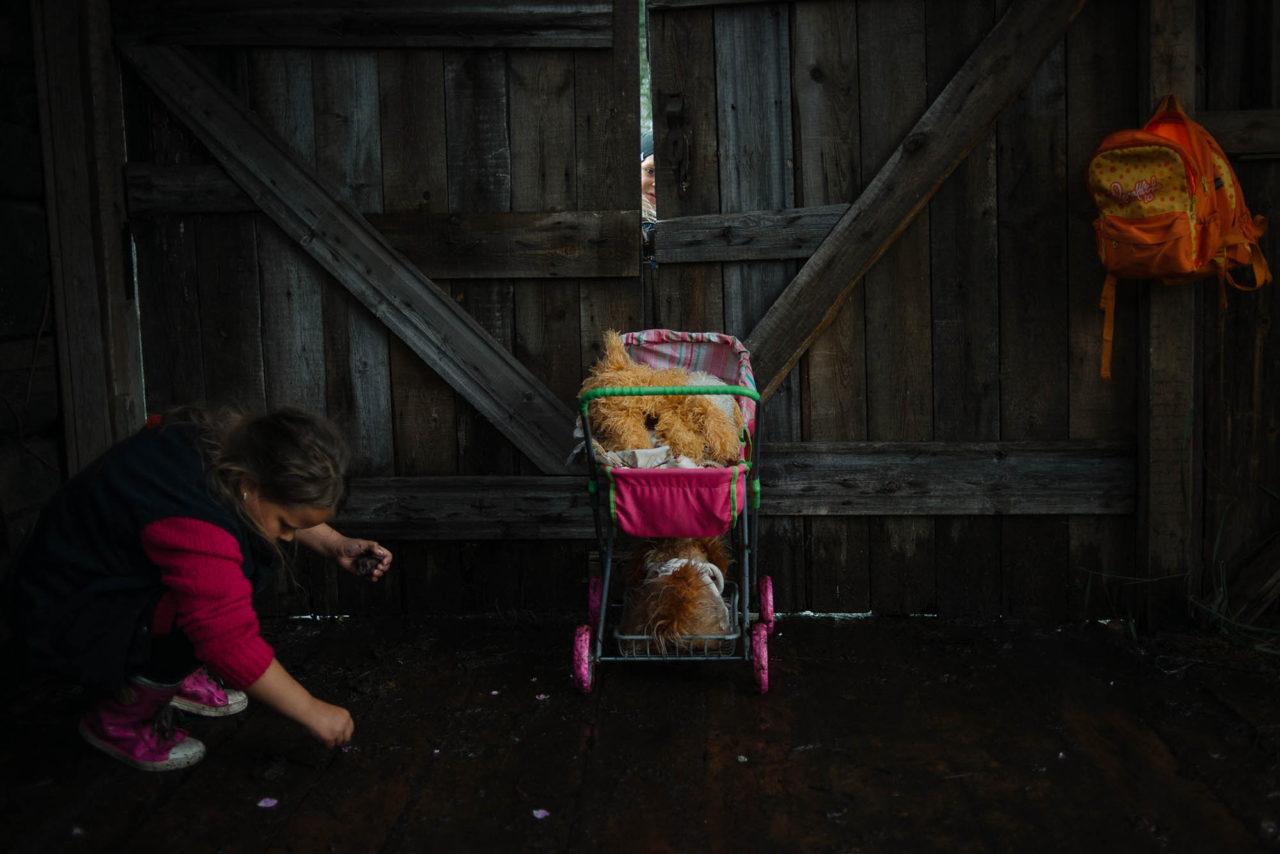
“Back when we had a chairman [of the kolkhoz], there was at least someone to turn to,” says Taisia Gavrilovna. “Now there is only Lyudmila. If someone needs to know something, do something, or wants to help, you go to her. She looks after us.”
“People ask me, ‘Lyuda, write this, Lyuda call here…” Ryntsina says. “So I write, and call, because someone should. I feel for the village. I feel for the people.”
When the elektrichka service that connected villagers to Belomorsk was shut down, Lyudmila wrote to officials, and, with her fellow villagers, gathered to block the railway. “Where else do you see this, that people have a station where they live, but no train stops there?”
The elektrichka schedule was partially restored.
For many years, Lyudmila sought to squeeze money from the government to repair the bridge connecting the two sides of the village – the lower and the upper. For decades the bridge was an accident waiting to happen: rotted boards, gaps in the decking. For years all she got was excuses, and then this summer the bridge burned down.
“I was at home,” Taisia recalls. “Suddenly I noticed a beautiful glow outside the window. I went over to look at the sky and saw, gracious me! It was our bridge on fire. And I thought, ‘Well, that’s it. Our life here has ended.’”
People here say nothing worse could have befallen the village of Shuyeretskoye. People lost the ability to visit one another. The lower part of the village was cut off from the cemetery, and the upper part from the store and station.
“It’s been three months, and I haven’t been able to bring my cat home,” Yelizaveta Stepanovna says, fighting back tears. “When the bridge burned, the cat was off somewhere on the other side. He stayed there and now can’t get home.”
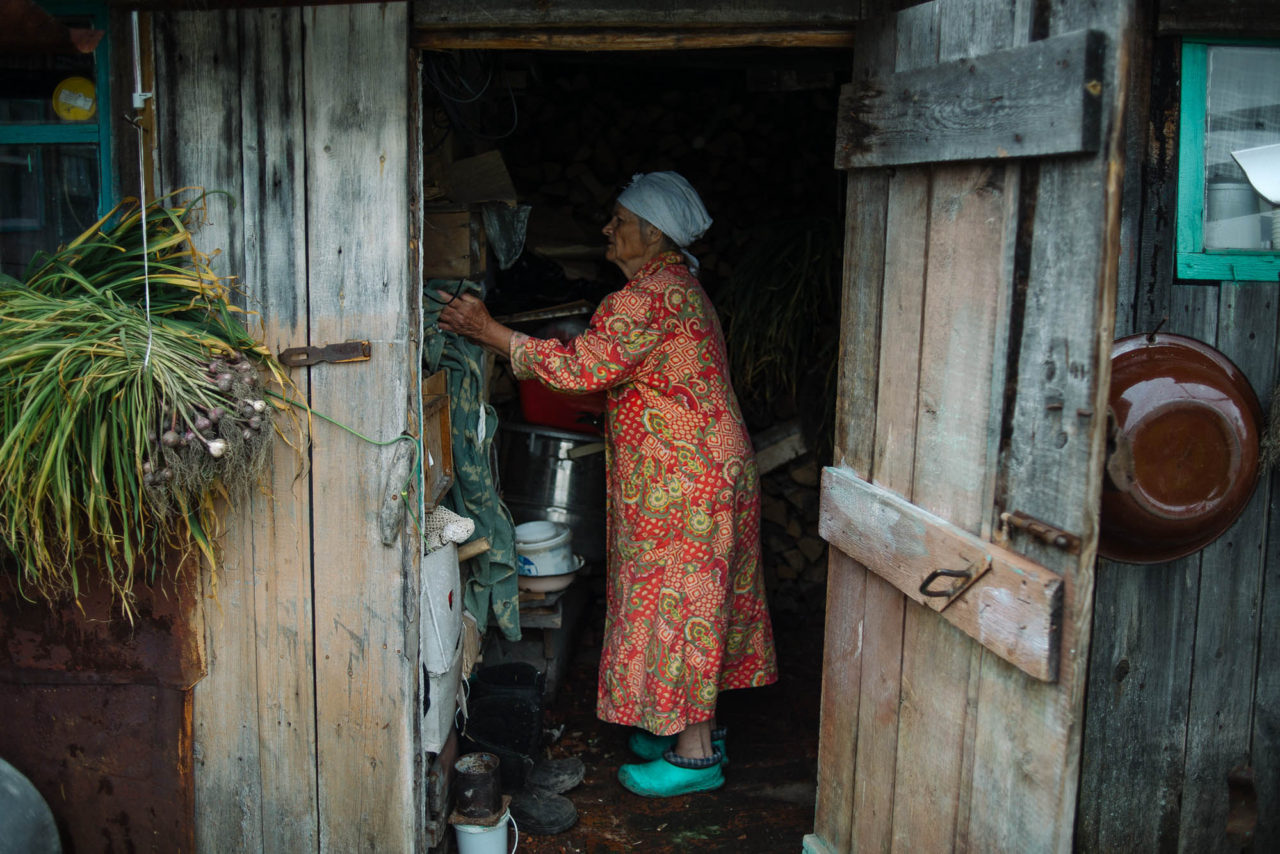
“I was in Kem when the bridge burned,” Ryntsina says. “First I called everyone I could, asking them to put the fire out. I tried to figure out who had keys to the fire pump. Then I phoned Sosnovets, where the government is, and told them what I thought of them. How many years had I fought for this bridge, and they just dragged their feet!”
When the bridge burned down, everyone tried to figure out how to go on. And they turned to Lyudmila. After talking to Lyudmila, the government in Sosnovets offered to hire someone at a miserly wage to wait on the riverbank and ferry people back and forth. But no one wanted the job. So Lyudmila began to ferry people herself in her motorboat, for free – anyone who did not have a boat of their own. She even took people at night when they had to catch a train.
“You can’t abandon people!” she says. “But it was humiliating when a certain resident accused me of ‘stealing all his clients.’ It turns out they found someone who would ferry people for 250 rubles. How can someone do that? Take advantage of our common misfortune to make money?”
But there was an unexpected upside: for the first time in many years, people united, and Lyudmila saw the village as it had once been, long ago.
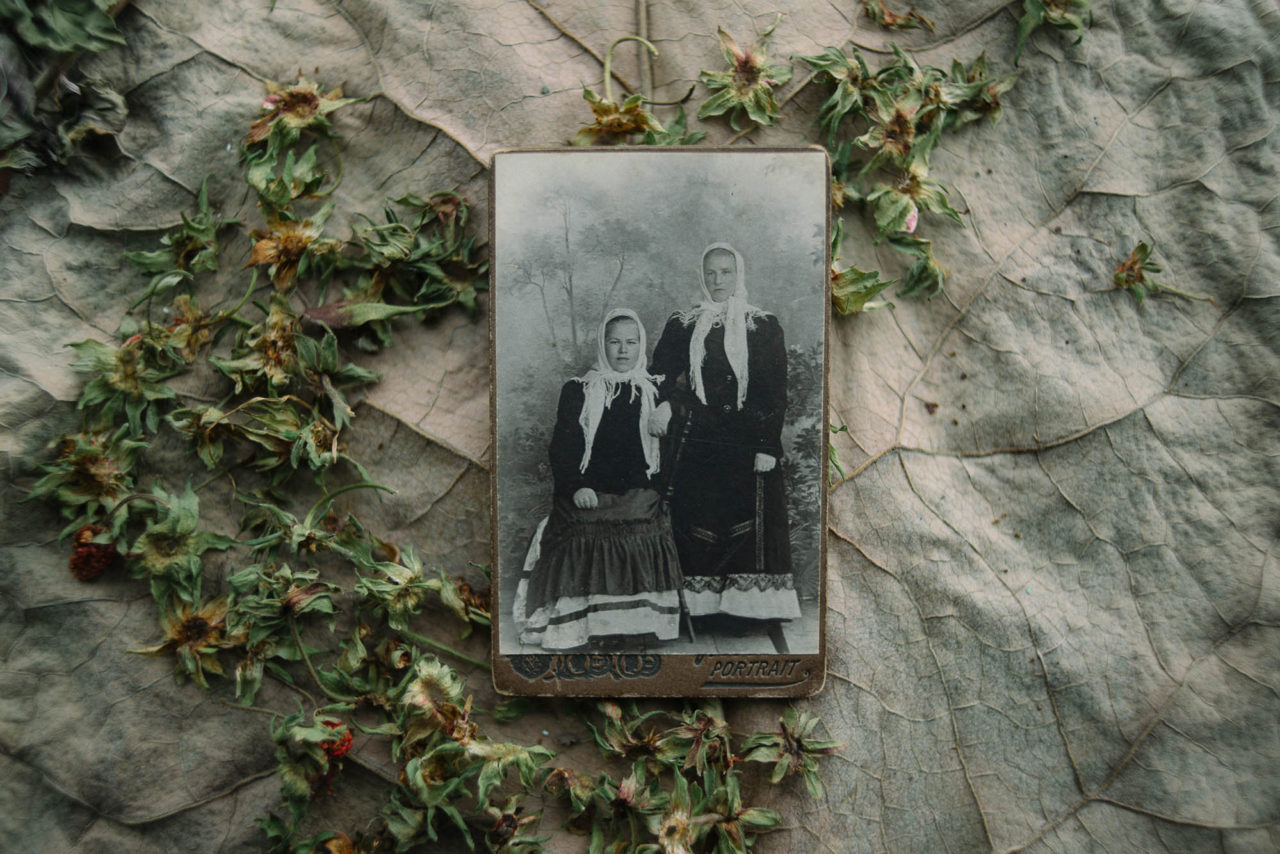
“We reached an agreement with the government that, until they build us a new bridge, they will create a temporary one across the Shuya River. They shipped boards to the train station, and everyone on our side of the village, even the babushkas, carried them to the site of the future crossing. People united, it was great! And, at the same time, I was able to order boards for footpaths. We basically have no roads here, just mud. For many years I have been asking them to make us wooden ‘sidewalks,’ but we’ve only ever been given excuses. But now the burned-down bridge helped – everything got stirred up. So, along with the boards for the temporary bridge, they also shipped us boards for the footpaths. It was all stored at my house, and I did not sleep nights; I was guarding it. You can’t get any wood here, they won’t deliver it for any price. The workers who built the portage lived with me. For free, of course. And so I asked them at the same time to fix the post to which the fire alarm is fixed, and to connect the wire to it that has been missing for 100 years. They did it. You cannot imagine how much all this meant to us. For years we had nothing – emptiness, excuses. And now there was finally some movement!”
The government promised the residents of Shuyeretskoye that they would build the bridge by September, because at the end of August the river rises, and the temporary bridge would have to be removed. If they did not succeed in finishing the bridge, then the village would again be cut in half.
Ryntsina has everything under control. While I was there, she called Sosnovets to get an update on the bridge. From the other end they answer that this week the iron trusses for the bridge will be arriving.
“When Kolya died, I could not think of anything else for six months and did not call any officials,” Lyudmila says. “But when the bridge burned down, I had to. Surely they thought I had died and wouldn’t be pestering them anymore. Didn’t turn out that way! We also have to sort out the electricity. All our electrical poles are rotting, and just a few have been replaced. When the wind blows, the lights go out. Also something needs to be done about communications – sometimes the phones work, sometimes not. There’s a heap of problems, a heap.”
SLAVES OF GOD IN A BOAT
When her husband died, Lyudmila’s relationship with the sea came to an end.
The only person who was able to navigate down the narrow river was her son Mikhail. But he lives in the city and cannot visit very often. Last year he took Lyudmila out onto the sea just once, and not very far. And there was no talk of sailing to Zhuzhmuy: the trip is too long and too dangerous.
Lyudmila resolved to sell the larger boat that she and Nikolai used to travel back and forth to the lighthouse. Why should it sit idle and rot away? A boat needs water and care. And a buyer was found. But Lyudmila recounts the sale through tears – it was painful.
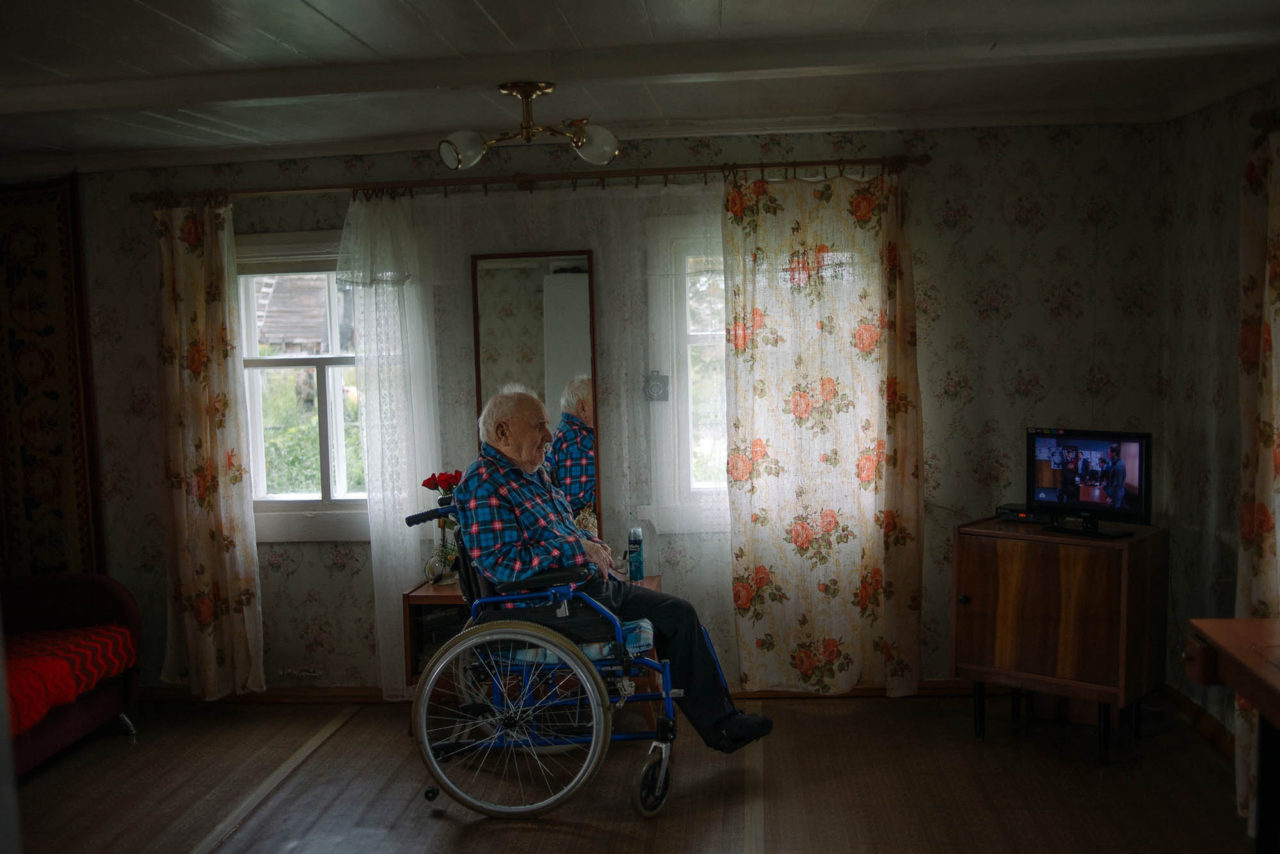
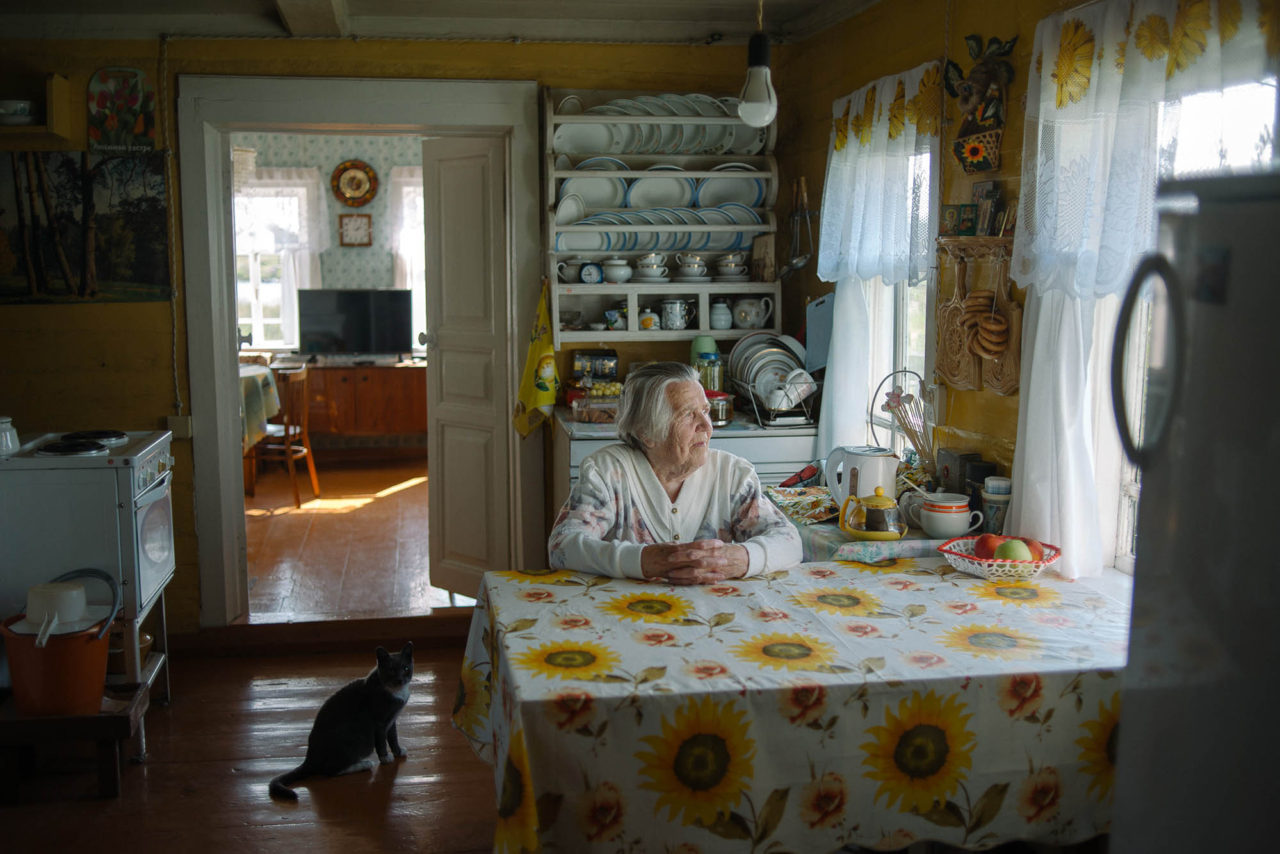
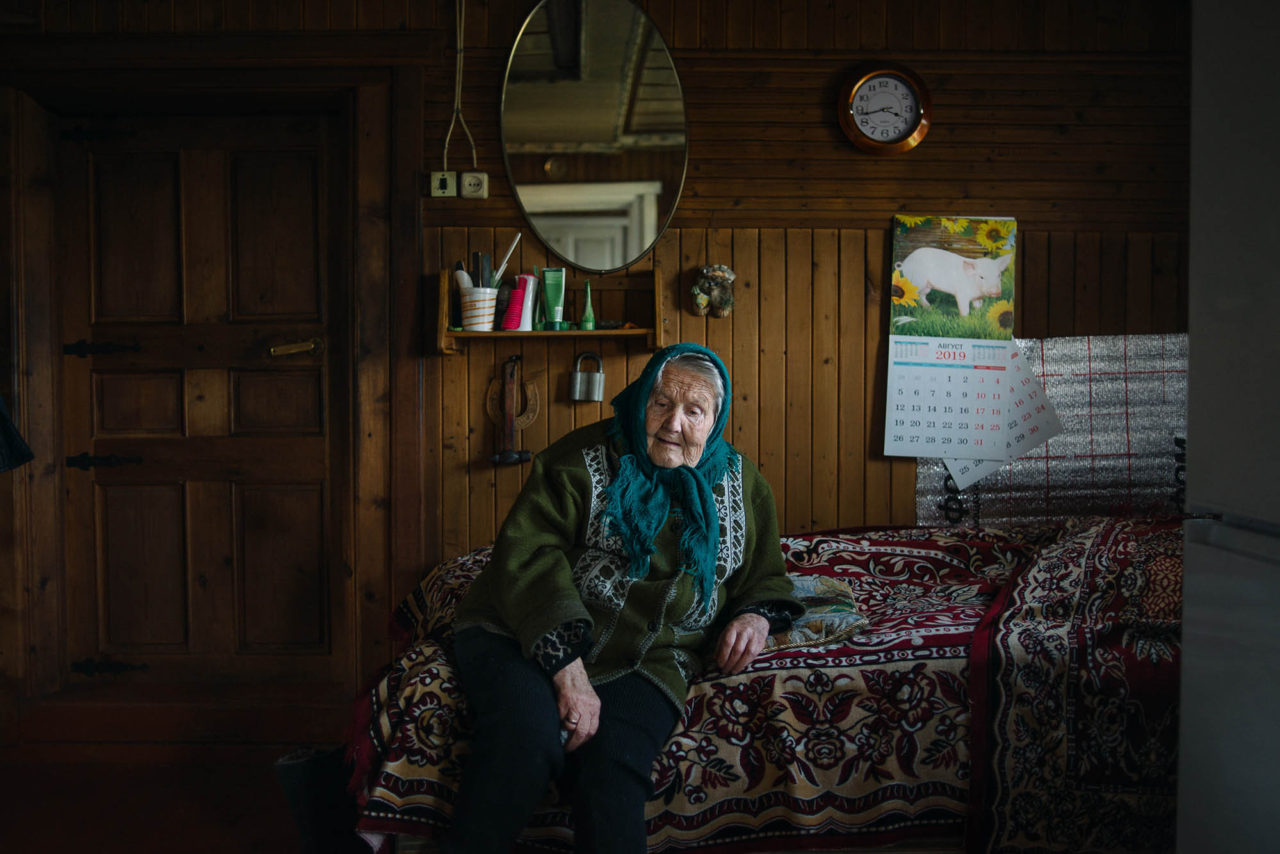
This summer Lyudmila has not yet been out to sea. She has no idea whether the lighthouse beacon is still burning. So we ask Mikhail to take her and us to Zhuzhmuy. He came down from the city, but the weather was too bad to go out. And Lyudmila would not allow us to risk it. We wait an entire week. Finally, the sky cleared and the sea calmed, so we decided to go. Not to Zhuzhmuy, but closer, to the Kuzovs – a chain of islands of unbelievable beauty located about 30 kilometers from Zhuzhmuy. And on a clear day Zhuzhmuy would be visible from there – it would be possible to see the lighthouse’s beacon, if it were lit.
A Pomor cross stands on the riverbank where the Shuya connects to the sea. Fishermen always began their journey here, and to this day they say a prayer at this juncture. Lyudmila whispers as she crosses herself, “Slaves of God in a boat on the water, may the water stay under the boat.” («Рабы божьи на воде в лодке, вода — под лодкой».)
It is a two-hour journey to the Kuzovs by motor launch. The water was calm at the river mouth, but on the sea the wind rose up and the weather turned cold.
We landed on an uninhabited stony shore. The island is home to red Fucus seaweed, reindeer moss, cloudberries, rocks, and a small fishing hut. There are huts like this on many of the White Sea islands – built by and for fishermen. They are a place to sit out the weather, to spend the night and warm up by a stove. There is nothing in the hut but a plank bed, stove, and some wood. Seafarers have a rule: if you use any of the wood, replace it before you leave, so it is there for the next traveler. There was also some jam, salt, and matches.
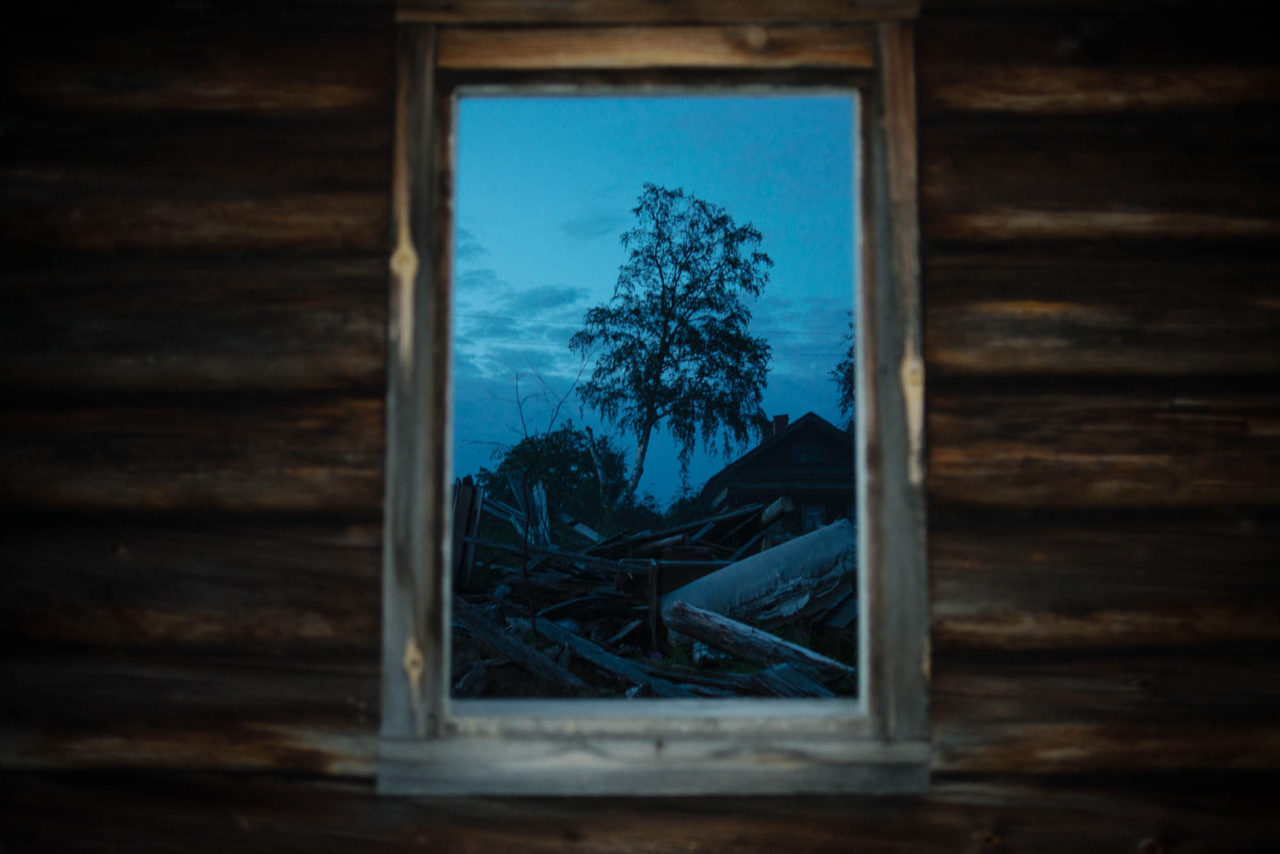
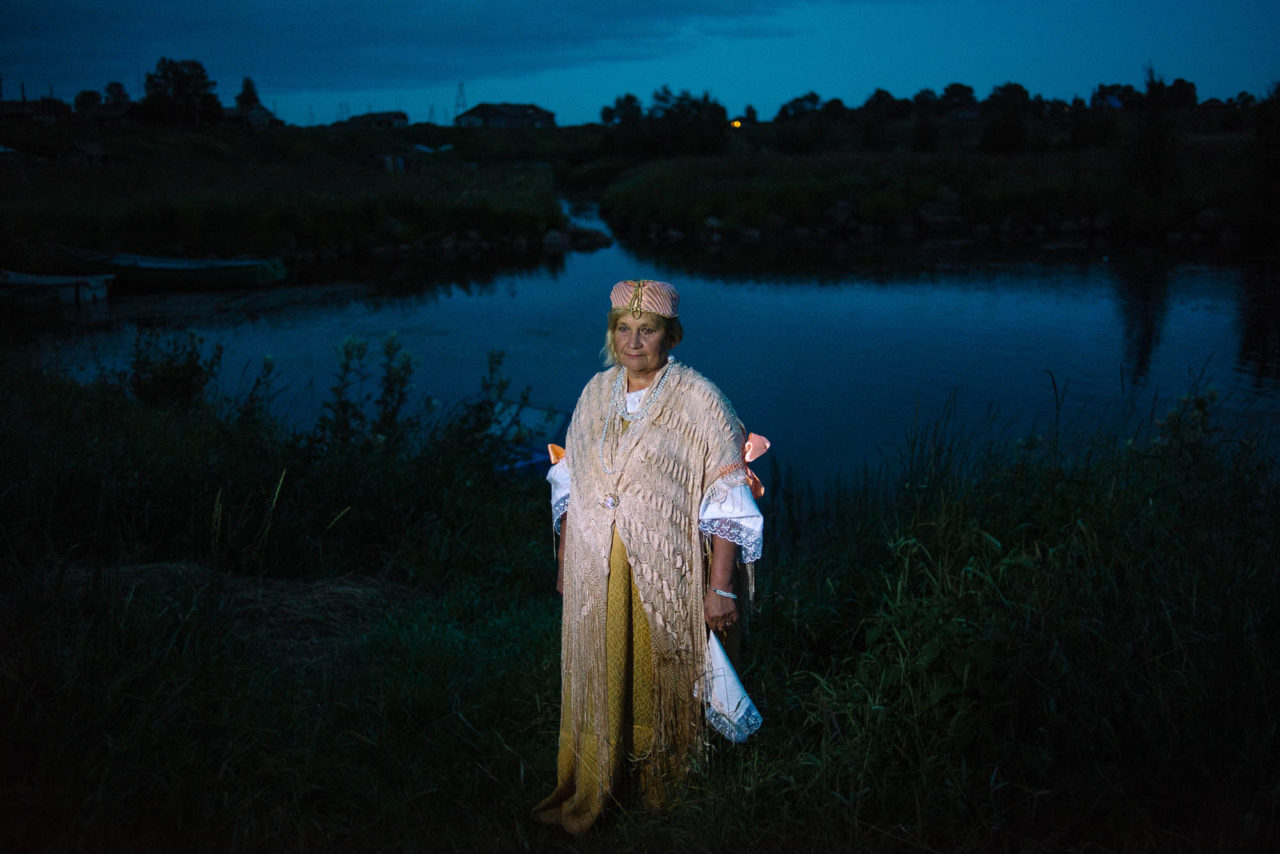
Lyudmila recounts how she and Nikolai lived for a week on an island in just such a little hut, waiting out a storm. “We left Zhuzhmuy but didn’t make it to the mainland. We sheltered on an island. Kolya caught some fish and birds, and that’s what fed us. I remember how happy we were to find matches in the hut! We could not have wanted for anything more.”
Our fishing was not going well, but finally the sea relented and sent us some cod. One huge fish was enough to cook some ukha, which we prepared over an open fire. Toward evening the restless waters transformed into a mirror.
On the return passage, not far from the hull of the boat, a sea lion emerged, noisily exhaling through his mustache. He examined us with interest, then disappeared beneath the waves. Soon he returned with a companion. “Vasya, Vasya, how are things?” Lyudmila asked the sea lions. A violet-veined jellyfish swam decorously past. And a seagull flew by, barely skirting the water’s surface.
“Oh, I have so missed the sea!” Lyudmila sighs. Then, quietly, “And look, there is Zhuzhmuy.” The island that was once her home, now inaccessible, can just be made out in the distance, rising above the stripe of blue. Lyudmila examines it through binoculars, searching for the beacon’s light. “Probably it has not yet been turned on; it’s still too light out.”
As it gets darker, Lyudmila again picks up the binoculars. She looks out over the sea for a long time and then says, “No, the beacon is not shining.”
“Perhaps they have already dismantled it for scrap,” Mikhail replies.
On the return voyage, Lyudmila stares out at Zhuzhmuy until it becomes hidden behind other islands. The darkness rising around us is enlivened only by a rusty stripe of light from the sunset. It is cold to sit in the boat. Suddenly I realize that Lyudmila is warming up my legs; our feet were touching in the bottom of the boat, and she is moving her legs against mine.
I do not immediately notice our arrival back to the village: the darkness surrounding us was suddenly punctuated by the rare light from a window.
Lyudmila’s thoughtful face glows against the dark backdrop of the water, and I think, perhaps, there is no point in being upset that the beacon of the White Sea lighthouse no longer shines. For while it may have gone out on the island, it continues to burn within her. Which means that in Shuyeretskoye there is still light. And life.
Every day we write about the most pressing social problems in our country. Based on our experience, we are certain it is feasible to address and deal with them only by reporting the real state of affairs. This is why our team travels across the regions, takes interviews, talks to people and experts, does photo reportages to sportlight and document people’s lives and stories. We collect money for charity organisations without any commission on our part.
Our media exists due to donations. We hope you can consider subscribing for a monthly donation to support our project. Any help is valuable, especially if it is set on a regular basis. Any sum from you is an opportunity for us to plan our work.
Please, sign up to donate and sustain our media and cause.
Donate